#we are just giving him the life every abuse victim deserves a chance at working toward
Explore tagged Tumblr posts
Text
People are always like "omg I can't believe they're a Billy Hargrove apologist," and no. He was a total cunt and deserves a little karma. But anyway, I'm going to fix him in the next 10,000 words, so just hold on a sec.
#this is for funnies#but like yeah we can explain a lot of his behavior through psychology and environmental exposure#definitely does not excuse his behavior - just provides an explanation#anyway this is fucking fiction my dudes#maybe we could just be cool to each other irl and enjoy our fiction alongside that no?#I will literally never understand why anyone is nasty to someone based on a fictional character lmfao#FICTION (bold highlighted underlined)#billy hargrove#anyways the vast majority of billy lovers are not condoning or making excuses for his actions whatsoever#we are just giving him the life every abuse victim deserves a chance at working toward#so like............woah
14 notes
·
View notes
Note
I'll never forgive this show for how outright emotionally toxic they made Marinette. She's like an abusive boyfriend who tells his girlfriend to always tell him if something is wrong and then makes everything about herself and tells the gf what to "truly" feel because HE is so "mature and experienced" unlike the gf
Didn't Marinette do exactly that with Shadybug when she dared to say that Marinette has a great life in comparison to her? Marinette outright told her "you're wrong" and acted as if she's kind for invalidating her opinion and feelings because she thinks SHE KNOWS BETTER and doesn't have anything good in her life
Anyone who thinks they know pain thats bigger than Marinette's is "wrong" and Marinette a kind martyr for telling people how to be and what to feel to be "correct like her". I despise how Marinette treated Shadybug, but no one talks about that. Marinette as good as bullied Shadybug into giving in jn shame and do whatever Marinette says is the next right thing for her to do and be to be "better". Marinette should have a restraining order against her, she treats people like playdoo in her hands to validate her hero and victim complex.
That's all Marinette ever does in s4 Ladynoir too. When Chat speaks up about not liking something Ladybug "teaches" him that his feelings and perspective are wrong and petty and that he has to get over it cause she's right and a benevolent goddess and he's just some pathetic cat who needs to be taught how to exist "right" cause she cant ever be truly in the wrong. Didn't she scream in his face in Glaciator 2 as Marinette that HIS feelings don't exist, and it's all about her? That's textbook definition of emotionally abusive. Telling others their feelings and perspective doesn't exist and it's all about you. It's crazy that Marinette is being supported for this by the fandom, I hope her fans aren't in relationships...
Or in Revelation, Marinette decides for the whole class that Chloe doesn't get to have a chance and effort anymore because SHE says so due to HER experience. And the others were made out to be naive backstabbers for not instantly falling in line with Marinette making it her class president speech to make support now conditional on HER opinion of the person. Cause that's not fucked up at all, no no no. Let's hope she's never truly angry with a friend cause she might just decide that they're unworthy of the whole support system she rules "cause she says so" (funny, isn't that what she did to Chat?)
She did not ask anyone WHY they think Chloe still deserve a chance, she just decided that SHE knows better and must teach everyone what to feel and think again.
And then she was pissed when that didn't work.
---
It all boils down to the same thing I keep saying: Marinette is always the one whose problems are the most important, and her minor grievances are more important than whether or not other people die. Of course she's going to tell Shadybug she has it just as bad as her, if not worse, just because she doesn't instantly get everything she wants every day of the week and sometimes some ineffectual mean girl says bad things about her. The most popular girl in school with all the local super celebrities as her friends and a loving, well-off family, who's also a superhero with a 100% approval rating sometimes has to be inconvenienced and she isn't constantly macking on her desired boytoy, so she's just suffering so much, it's unbearable for her. We should feel sorry for her.
Marinette is the icon of any dissatisfied little girl with no real problems who's just frustrated at still being a kid with little freedom and takes it out on her friends by giving them the silent treatment because they didn't agree with her over something. Marinette is the fantasy of being the single most special and important person in the universe, where everyone else is little more than an NPC that exists to praise you or serve as a minor obstacle that you can easily overcome in order to feel good about yourself. The thing about this kind of fantasy is that you have to be completely uncritical in order to enjoy it, the instant you start to wonder if perhaps someone else deserves some glory too or if the other characters should get to have priorities outside of the protagonist's wants, the game is lost. That's why Marinette stans only think about her actions in terms of how they can excuse them. It's about enjoying the power fantasy.
A lot of power fantasies get defended with the claim that such protagonists aren't meant to be emulated, that it's purely cathartic. But kids try to emulate everything they see on TV, sometimes even when it's something they “should know” shouldn't be applied in real life. This is why you don't see punches connect in children's cartoons, the impact shot instead gets cut away with a jump cut or replaced with an impact graphic or flash. Kids will see the characters they relate to punch people and it being a good thing, and the next thing you know they'll be punching someone for real as part of a game of make belief. There's a reason kids' power fantasy media usually involves harmless scenarios like your belief in the Easter Bunny and Jack Frost saving the world from the Boogeyman and not the kind of stuff you see in an isekai harem anime or the stuff you'd expect from the villain of a school story.
Marinette constantly treats the people around her as unimportant, and she really does act and talk like she thinks their concerns are nonexistent in comparison to hers. The one time Marinette can be bothered to think about others it's when she has nothing going on first, and even then she just forces her ideas on what others need on them like, you know, a power fantasy isekai protagonist. She also does act as the leader of the friend group. I know she's the class representative, but that doesn't mean she should be giving orders to her friends and telling them what to think, but, as of the retool, that's exactly what she's doing. She's literally the Queen Bee archetype, and it shows in how she gets away with committing a literal crime at school in 'Confrontation'.
I don't think a protagonist for a kids' show should be shown consistently treating the people around her like shit, simply because showing and addressing such a storyline over several seasons takes so much time that it makes it harder to connect cause and effect. It's just a hard lesson to teach in such a format. Kids would see something being shown uncritically/as not that bad for potentially years before the show turns around and says it’s bad, actually. The fact that the narrative doesn't even go for this, but instead expects us to side with Marinette is more annoying, though, than if they’d just been that incompetent. Now the actual point is to be uncritical of Marinette’s self-centeredness.
This is why the target audience for Miraculous being so unclear annoys me so much. Do they expect the audience to see Marinette as a role model or is the audience meant to see that what she's doing is actually bad in real life but to also enjoy it as a fictional fantasy of being the most important, specialest person ever? You can expect the latter kind of more complex thinking from teenagers, who enjoy power fantasies possibly the most out of any demographic, but that means that Miraculous’ target audience jumped from preschoolers to middle schoolers because they decided they’d rather be uncritical of Marinette’s personality flaws. But the biggest part of merchandising for this show is still toys aimed at preteens, and even the toys reflect the new “The New Adventures of Ladybug and Ladybug Alone” approach of the show with the latest, insanely overpriced, Magic Heroez Transformation Surprise toy line being nothing but Marinette with the other characters’ Miraculouses. “If you like any hero other than Marinette, fuck you, you stupid kids!”
25 notes
·
View notes
Note
bruh please get into why you don't like shota I'm genuinely interested 🙏
Reasons why I don’t like Shota:
- Is easily the worst teacher in MHA: we never actually see him do his job. Every time we see him in a school setting, he’s either asleep or he pawns off his work to other teachers. He doesn’t give his students any advice except “do better” and he’s shown to be willing to drop students on THE FIRST FUCKING DAY OF CLASSES if they don’t suddenly improve. Izuku’s the biggest example of this. If Shota was good at his damn job, he’d read about his students ahead of time and learned that Izuku only had his quirk for a few months so it’s obvious that he won’t know how to use it properly. A real teacher would see this and offer aid, only expelling Izuku if he shows absolutely no improvements after a month or two. He managed to pass the entrance exam which means he’s more than worthy of being given a chance compared to the Gen-Ed students who failed to get into the hero course (looking at you Hitoshi). Meanwhile, Katsuki attacks Izuku on the first day and even sabotages his score yet Mr. “Logical” here doesn’t expel him. Adding to this, when Katsuki nearly kills Izuku, all he tells him is to “grow up”. These instances show him as outright neglectful and lazy. It gets even worse when you realize that the only time he actually tried doing his job, he fucked up big time by forcing an abuse victim to work with his abuser. Oh, and don’t get me started on him using Eri to further Katsuki’s growth in one of the light novels. Shota, it’s not the responsibility of those abused to help an abuser grow. People love to rag on All Might for his teaching, but while All Might sucks at his job, he at least tries. Shota is neglectful, abusive, and just an outright asshole at this point.
- Is a mouthpiece for Katsuki: despite Katsuki being a student Shota should’ve expelled right off the bat based on what we’re told about him, he instead praises Katsuki and is used by Hori to wank him off. He tells the people rightfully booing him during the Sports Festival that he was “giving it his all” against Ochako when all he was doing is just standing there and swatting her away when he could’ve easily took her out in one or two blows. Katsuki even says that it’s “time to get serious” after Ochako’s final attack, which meant he wasn’t taking her seriously to begin with. When people rightfully question Katsuki’s behavior after his kidnapping, Shota says that “Katsuki deserves to be a hero because he tries hard”. Bruh, just because you try hard doesn’t mean you deserve shit, especially when you’ve repeatedly proven that you can’t handle the responsibilities that come with being a hero.
- Doesn’t care about the mental health or the future of his students: One of the first things he does in the series is tell Ochako that knowledge of the school’s various facilities, including the guidance counselor, isn’t important. He then proceeds to use his little “logical rouses” which all that does is make sure none of his students can trust him with anything. He singles out Izuku and calls him a liability in front of his classmates instead of taking him to the side. His little “expulsion game” is also very harmful. In Japan, grades and academic records are highly valued. Any blemish can fuck up a kid’s future. By suspending his students, he screwed them over in the long run, especially since they’re in an “elite school” like U.A. Any kid who’d rather take a different path in life is fucked because Shota suspended them on the FIRST DAY of school. And for what? Not being at the level of a sidekick or pro hero? Except for those who had to take quirk counseling due to uncontrollable quirks, none of them had formal training, so who is he to say they can’t be heroes on the first day? All they had is one day to prove themselves on some shitty fitness exam that doesn’t even test their character or willingness to learn. Shota preaches about life being unfair but he’s actively making things unfair just because he’s got a God Complex.
- Is a hypocrite: Shota hates people who spam their quirks and only rely on them, so what does he do? Takes in a kid who does exactly that as his mentee just because he reminds him of himself and of his dead friend (Hitoshi’s my third least favorite MHA character in case you were wondering). He dislikes All Might for supposedly playing favorites but he does exactly that. We actually see him training this kid over his class, said kid who hasn’t done anything to achieve his dream.
-Narrative wanks him off: Never is Shota’s actions called out. He’s never made to be in the wrong. Every character loves him and those who don’t (like his previous class) are made to be in the wrong or are made to be assholes. However, unlike Katsuki, he at least isn’t completely covered by plot armor, having lost his leg and part of his eyesight due to battles he’s taken part in.
- He dropped a FUCKING BUILDING on his students during one of the OVA’s. Enough said. Somehow he’s been more successful nearly killing his students than the villains have at killing 1-A.
At the end of the day, Shota’s an abusive, neglectful, hypocritical, and egotistical asshole with a God complex who never gets called out on his bullshit. He may be a decent hero, but that’s really not something that overrides all his shitty traits. I see what Hori was going for, but like with a lot of things, Hori misses the mark and forgets what makes characters of Shota’s archetypes work in the first place.
#mha critical#anti eraserhead#anti shota aizawa#anti aizawa shota#anti bkdk#anti katsuki bakugou#anti bakudeku#anti bakugo katsuki#anti bakugo#anti bakugou#anti hitoshi shinso#anti shinso hitoshi#anti hitoshi#anti bakugou katsuki#anti shinsho#bnha critical#aizawa critical
452 notes
·
View notes
Text
I think a lot about the concept of redemption these days.
It’s a nice idea to have. The idea that even if someone does shitty things, they can still become a good person and fix all their mistakes. But as much as we all love Zuko, Peridot and Catra (I haven’t seen She-ra myself, but I suspect I would also love Catra if I did), the reality of Not Being a Shitty Person anymore is always way more complicated. Especially today, when we’re faced with the reality of so many of our fellow countrymen- including our own families- being capable of awful things. What happens when a white supremacist sees the error of his ways and cuts ties with the Klan? Or a transphobic parent finally comes around to accepting you for who you are? Yes, it’s great they’ve realized their mistakes and are working to be better, but they still hurt people. The damage doesn’t magically go away just because they know it was wrong now.
But on the other hand, shouldn’t we be able to forgive those who genuinely want to fix their mistakes? Even if they’ve hurt us, surely if they’re willing to try and make things better, it’s worth giving them a second chance, right?
But on the other other hand, how can we be sure they’ve really changed for the better? We know they’re capable of terrible things, what’s stopping them from relapsing just when we think it’s all safe and ruining our lives all over again? Why bother taking the risk when we’d all be safer without them?
But on the other other other hand, if we don’t give shitty people a chance to actually try and be a normal person, aren’t we just dooming them to be a shitty person forever? If a Klansman doesn’t have a viable exit strategy for escaping a literal cult, chances are he’s just gonna be a Klansman forever. And shouldn’t the end goal be reducing the number of shitty people whatever it takes? Don’t we have an obligation to give people that chance so they actually have a shot of escaping the grasp of whatever malice sunk its claws into them?
But on yet another hand, isn’t it kind of shitty and unfair to place that burden on the people they’ve hurt? Just because someone’s getting better doesn’t mean their victims should just forget the damage they caused and let them back into their lives. Sometimes it’s for the best to cut people out for good, let them live their improved lives somewhere apart from yours. How can you tell someone they’re obligated to look out for the well-being of a person they have good reason to never want to spend another second with?
Zuko doesn’t prepare you for that.
But Bojack Horseman does. Bojack forces you to examine, re-examine, and re-re-examine every last question I raised above. All the people Bojack hurt, all the damage he caused, all his struggles to be better... what does redemption look like for someone who’s hurt so many people in ways that can never be taken back? How does an alcoholic, misogynistic, enabling, abusive, callous near-pedophile even begin to try and make a fresh start with so many corpses and consequences hanging around his neck? Can he be better? Should he be better? Does he deserve to be better? Or has he caused so much harm that nothing will ever be enough to close the wound?
That’s what makes the final episode of season 6′s first half so devastating Over the past seven episodes, we’ve watched Bojack finally climb out of the hole he’s lived in all his life. He’s gotten sober. He’s gotten wiser. He’s finally becoming something resembling a functional human being (or, well, horse-an being). He’s looking out for his friends. He’s repairing what he’s capable of repairing. For the first time ever, Bojack Horseman is on his way to a truly happy, healthy life, where he can support himself and be there for the people he cares about in equal measure. But A Quick One While He’s Away is an ugly reminder of all the sacrifices it took for him to reach that point. Sarah Lynn, Penny, Gina, Kelsey, even Pete of all people in the cruelest callback cameo of the entire show. Bojack has hurt so many people, broken so many lives, on his path to becoming a decent person. And as he prepares to set foot into the real world as the closest thing to a good guy he’s ever been, this episode shows up to asks us if it’s even possible to root for that anymore.
I don’t know how to answer the question of Bojack Horseman. Just as I don’t know how to answer the question of every real-life asshole like him who tries to break good. But I can tell you this: I’m never gonna be able to stop thinking about it.
24 notes
·
View notes
Note
Hi! I've been in the Hannibal fandom for two years now. Rewatched the show many times and yet Will Graham still confuses me like no one else. Hannibal's design is complex but somewhat understandable after watching the show again again. But Will's design is like a loophole. He can empathise with the killers. That means he can understand them. If he can understand them then why does it feel good for him to kill them? How does it work for him exactly. Does he feel for the killers? If he felt for the killers then what about his violent tendencies towards them?
I've always thought that he is like a God. A God of the killers. The killers offer him their design and he takes sacrifice in return of understanding. But how does his psyche work exactly?
Hello! Oh yes, Will is a very confusing character - it’s his defining trait, and I think that’s because he lies to himself, to others, and to us as an audience. He wants one thing, wants to want another thing, does the third thing, and making sense of it is a complex process.
I think Will’s empathy is a big red herring. I agree with Freddie here: he understands killers because he’s one. He has an almost supernatural gift that helps him recreate the situations almost exactly as they happened. He understands what motivates killers, he might sympathize with them, but I think he might also envy them their freedom to be what they are. They are a reminder of what he is and what he can’t allow himself to have. But most importantly, they are a way for Will to find a compromise with himself and feel better about his true self. Killing bad people is an excuse to justify his darkness, but I don’t think it’s a part of his design per se.
I agree with you that Will is like a God - he and Hannibal both are. That’s one of the things that separates them from others and elevates them above everyone else. Let’s make an overview of Will’s victims.
1) Hobbs. Hobbs was a monster and Will killed him. But it wasn’t about justice and righteousness, not according to him. Killing a person and feeling pleased that you saved someone versus liking the act of killing itself are drastically different things. Many police officers have to kill in their line of duty. Very few of them get off on the act of murder. Those who do are killers, and they are especially dangerous if they immediately try to follow it up with another murder. Will never once says he liked killing Hobbs because he made this world better. When asked, he says that he felt a sense of power. This is a motivation of many actual serial killers. If Will was just glad that he saved Abigail, he would know it's normal. He wouldn't have been almost on the verge of a break-down and haunted by Hobbs. So it’s not about helping others, it's about murder, even if the victim was a monster.
2) Stammets. Will had no reason to try to kill him (which he admits to doing). Based on his and Hannibal’s talk, he understands that he just wanted to feel what he felt after killing Hobbs, and this makes him panic. So again, no someone. He’s chasing the high of killing someone, and Stammets is the most appropriate victim.
3) Ingram. On the surface, it looks like Will wanted to avenge Peter and himself by proxy, hence pulling the trigger on Ingram. However, after Hannibal manages to stop him, days later, Will complains about losing a chance to feel how he felt when killing Hobbs. Murder high is his main motivation again - everything else is background or an excuse, depending on your reading.
4) Randall. Will threw away the gun on purpose to make the murder more intimate. This is not about justice and this is not about protecting himself because by doing this, he reduced his chances. Will also beat Randall up until he wasn't moving. There was no reason to snap his neck. Mutilation, cannibalism that followed, keeping his suit, admitting he enjoyed the murder and calling it his design - this is about murder and WIll’s love for it primarily. The design part is especially important: based on it, we can conclude that Will loves a performance just like Hannibal.
4) Chiyoh and her prisoner who Will set up. Chiyoh was innocent and didn't deserve to die. Her prisoner might not have been guilty - in fact, Will was the one to suggest that, and yet Will still set him up. It was a game and he was an observer - he lied in waiting for Chiyoh’s scream. He then turned the body of a losing party into art. Very creepy and very like Hannibal.
5) Chilton. Will clearly explained his motivation: he wanted Chilton to pay just because he wanted to be famous and messed with Hannibal by writing his ridiculous book. Will showed no remorse and admitted he did it on purpose.
6) Police officers he set up to be killed by cooperating with Francis. The ones he stepped over without a second look. They were innocent and they were a collateral damage. Will is a cruel God who doesn’t bother with mere mortals as long as it fits his purpose. In this case, his purpose was freeing Hannibal. Everything else was still a blur in his mind.
7) Francis. Enjoyed the murder, admired the blood, called the situation beautiful.
8) Bedelia. She's innocent in comparison to Will and his body count. If Will faced no repercussions and continued getting more and more people killed, she had every right to go free. But God doesn’t have to be fair, and Will proves it by targeting her.
What does it all say about Will’s design and philosophy? Apart from Godlike attributes and indifference toward collateral damage, I think Will is led by his bloodlust - he just tends to control it and direct it at specific targets.
Will might prefer to kill “bad people” in the first two seasons, but it’s the process of murder that excites him. So I see his righteous choices as a preference that helps him justify his dark nature partly, not the core reason for his violence. Hannibal seems to be moved by his interest in human nature and his hunter instinct, but Will, I think, is a truer killer because he actually feels drunk on murder. Unlike Hannibal, he looks downright euphoric when/after he kills Randall and Francis. In TWOTL, Hannibal is more focused on the fact that his dream came true and he and Will killed someone together, but Will seems primarily caught up in the murder after-shocks themselves. Hannibal thinks about Will, Will thinks about how beautiful blood looks under the moonlight.
So, post Fall, I believe that at first, Will will stick to killing bad people like murderers, but once some times passes, his need for justifications will fade. He’ll move on to rude people, only his rude will differ from Hannibal’s. Hannibal doesn’t differentiate between genders and ages, but I think Will will. He’s interested in a feeling of power, like he himself says, in a sense of dominance, so he’ll look forward to a fight. He won’t be interested in attacking a teenager like Cassie, for instance, because the power imbalance is too prominent. But as soon as someone more equal does something Will heavily dislikes, something that wakes his bloodlust (a personal insult, physical or verbal abuse toward other people/animals, etc.), he’ll attack. He’ll be careful - he knows how to avoid being caught, but it will still be unpredictable and passionate. Will is a storm to Hannibal’s calm.
Then there is unpredictability. Hannibal tends to plan everything methodically. The only times we see him being impulsive is in Europe, where he’s descending into self-destructive mode, so it’s not a norm for him. For Will, though? Will consists of unpredictability, and Hannibal is fascinated by it.I think Will is going to kill when an impulse strikes. For example, he might go shopping, without having any dark plans, and end up murdering someone because the circumstances pushed some unfortunate soul onto his path. Will might or might not display the body depending on his mood. Today he can be in an artistic mood, but tomorrow he’ll be in a violent and impatient one, wanting to destroy the body entirely and leaving a total mess behind.
How Will would prefer to kill? In my opinion, in an intimate way. It doesn’t mean he’ll be weaponless, but something like a knife would fit his tastes well. He’d be able to feel it plunge into his victim’s body, tearing through skin and muscles, etc. - personal and intimate. Akin to what he did with Francis - his feral half-snarl, the way he paused after stabbing him before opening him up - it was dark and mesmerizing. Will might get into strangling, too, because it takes a lot of time and it is even more intimate. It might end up being his favorite. So, I can see him using his hands or small weapons to fully sense what he’s doing to a victim. This is something that he has in common with Hannibal because from what we saw, Hannibal also enjoys more intimate and prolonged murders that give him a glimpse into a person’s pain and struggle for life.
359 notes
·
View notes
Photo
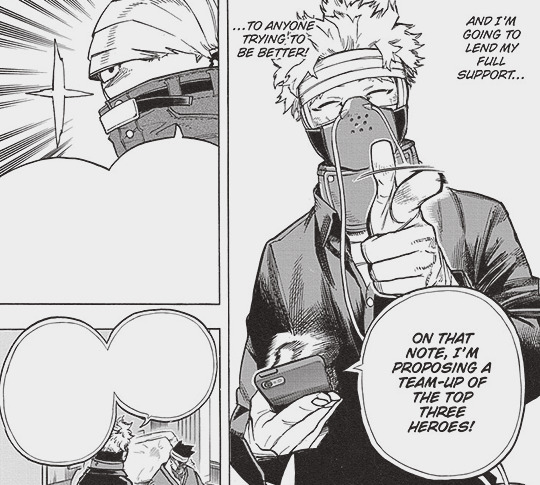
THE TOP THREE HEROES ARE ALL FAILURES
In the sense that Enjdeavor, Hawks, and Jeanist all embody the failures of the hero system. The first clear sign that all three people who were set to inherit All Might’s Legacy would fail in doing so, is that none of them really understood what kind of hero was in the first place.
Endeavor only ever saw All Might’s Strength, and thought All Might’s genuine desire to save people was just him playing to the crowd. Hawks thought Endeavor’s desire to surpass All Might was heroic, and what made him a better hero because he didn’t give up when everybody else said it was hopeless, but we the audience know Endeavor gave up early and took it out on his family instead. Best Jeanist thinks what’s most important of all isn’t saving people but rather “The Image” of Heroes to the public. Except, the only reason All Might was a hero obsessed with image is because he wanted even those he could not reach to be able to live in peace and save themselves.
The top three heroes are all lacking in what All Might had, in that none of them actually believe that Heroes should save people. Enji believes in strength above all else, Hawks in sacrificing one’s self for the faceless masses, and Best Jeanist in the image of heroes to the public.
It’s really showing that the option of “Saving Dabi” did not even occur to them once, despite the fact that they are completely willing to give a helping hand to the man who made Dabi.
The current number one, two and three heroes are all obsessed with All Might’s Legacy, however all of them are failures to All Might’s Legacy as well because they don’t understand the underlying ideal of heroes saving people. All three of them represent the failures of hero society, which is why they aren’t shown being overly concerned at hero society’s victims. Even when it’s revealed that one of hero society’s greatest villains Dabi, was actually one of hero society’s greatest victims too, created by one of their own, their beliefs barely change.
1. Enji Todoroki
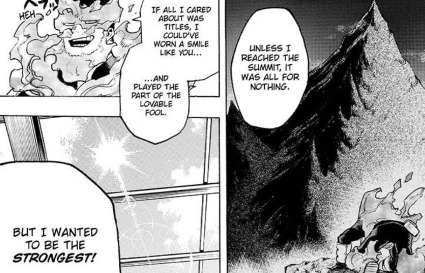
Enji was never concerned with saving others being the job of a hero. His one and only focus was just to be the strongest. He even has a shallow view of All Might’s ideals and goals because of this. He thinks the reason that All Might won number one was because 1) his all powerful strength and 2) his popularity with people.
Enji never once mentions that All Might became the hero he was, because his number one priority in every situation was to save as many people as he could. Because, Enji doesn’t view it as the job of heroes to save others.
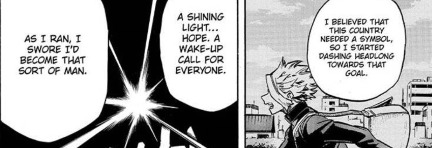
Toshinori worked so hard because he genuinely wanted to be the shining light for others. He didn’t become the number one hero because it was his own personal dream, but rather because it was others needed of him. All Might isn’t a perfect hero either, but there’s still a difference between someone who wanted the number one spot because he genuinely thought it would save the most people, and someone who wanted the number one spot because he wanted to be the strongest.
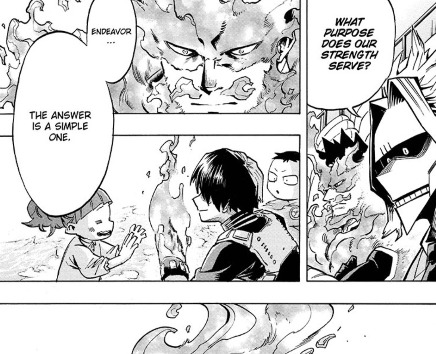
Even after Endeavor’s supposed revelation where he saw Shoto being gentle with flames, rather than forceful and violence, Enji became the exact same kind of hero he was before.
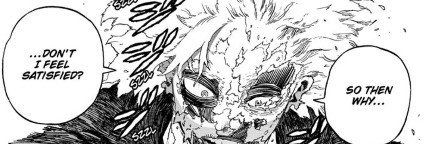
Think of the way Enji fought Shigaraki, burning him alive. He made several attempts to kill him during their fight, even though the rule is heroes absolutely must not kill, that’s what makes them different from villains. Heroes prioritize the safety of people, and saving civilians, except for Endeavor apparently. Endeavor as a hero is the exact same kind of hero he was before, and the flaw with that is if he had fought Dabi the same way he had fought Shigaraki.
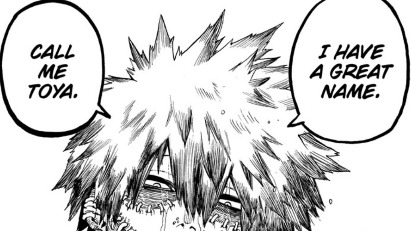
He would have burned his own son alive. Enji isn’t even concerned in the least with saving people, even when the person most in need of saving is his own son. He sees villains as an absolute evil for him to punch and beat up in order to prove his own strength. The only way Enji knows how to be a hero is violently taking down crime and no one has ever challenged this, even though it’s the exact attitude that led Toya to his death.
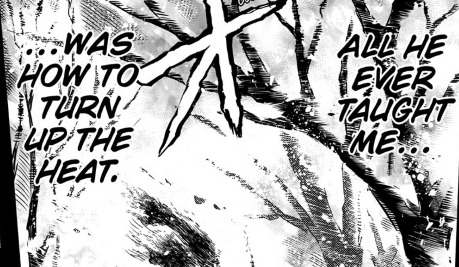
Enji, only ever taught Dabi how to turn up the heat, because Enji wasn’t actually that concerned with his son’s well being. Toya was only worth something to him when he was strong, so Enji only ever taught Toya how to be the strongest hero and nothing else that a father should teach his son. Even now, Enji doesn’t let go of this idea of his that he has to be the number one hero, and being the strongest hero will solve all of his problems.
Endeavor has used playing hero again and again as an excuse to run away. Now that Hawks is giving him another chance to be hero, he’s enabling him to run away again.
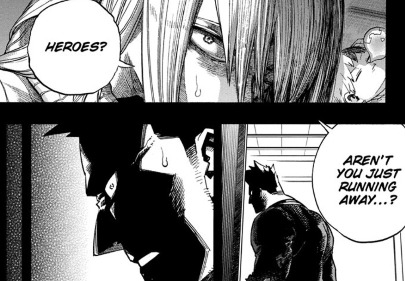
It’s incredible how still even after the reveal, it’s always Toya who has to pay for the consequences of Endeavor’s mistakes. Toya is left alone to burn to death and spends the rest of his life covered in burns forgotten by his father, and it’s Endeavor who gets the unconditional support and love Toya needed as a child offered to him, just because he happened to be a hero. If he was a villain he would have just been locked up.
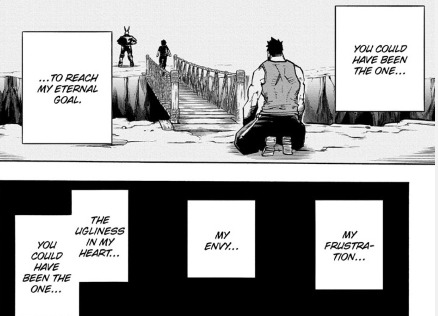
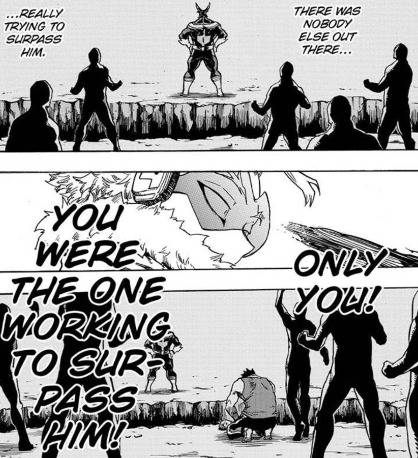
Endeavor is framed as the hero who does not give up, and yet, he very easily runs away and lets Toya take the blame for the majority of his actions. If Toya had been able to carry his dream he would not have abused Shoto. If Toya had not died that day he would not have doubled down even harder on Shoto. Toya’s the reason they could not come together as a family. It’s never Endeavor’s actions, it’s always, somehow, Toya who is blamed, and Toya who is burned as the consequence of Endeavor’s actions. Now, Toya is the one who needs to be stopped when Enji is just as guilty.
I’m not saying that Enji should not be given a chance to get better, but why is the good side of Enji’s actions expressed over and over again and not Toya’s? Toya is trying to reform all of society. Toya is trying to hold his dad accountable for abusing him and neglecting him to the point that he died. That’s murder. Someone who lets their children die because they couldn’t be bothered to supervise them can be charged with involuntary manslaughter in a court of law. Enji has killed too, but rather than admit to his own flaws it’s must easier to cast Toya s the villain that needs to be stopped and himself as the hero that needs everyone’s support.
Toya deserves the same chance that Enji got.
2. Hawks
Hawks only saw self sacrifice in All Might’s actions. He saw someone harming himself over and over again for the sake of others, and that’s probably why he admired Enji’s pursuit of strength more because it was the opposite of him.
If Enji is the extreme result of the attitude that villains can’t be saved, only stopped by putting themselves down with violence, then Hawks is the extreme result of self sacrifice. Hawks seems like the ideal hero on paper, he would do anything, and give up any part of himself to save a faceless stranger just like All Might. However, Hawks also has decided that he has the right to sacrifice others as well.

Hawks is self-destructive. That’s the extreme end of self sacrifice. However, unlike All Might who took the burden entirely on himself, Hawks will choose others to sacrifice as well. If Hawks sees himself as a tool for the greater good he will extend that to others as well. If Hawks sees himself as a bad victim who turned his back on their parents, he extends that to others as well.
So basically, Hawks’ number one problem is with himself. He can’t reconcile his past. He feels guilty for being abused by his parents. He feels guilty for not forgiving the same abusive parents. He puts everything he has into being a hero, and yet, he doesn’t feel like he himself is a hero. Hawks’ only way he knows to feel good about himself is to continuously sacrifice himself for the sake of others.
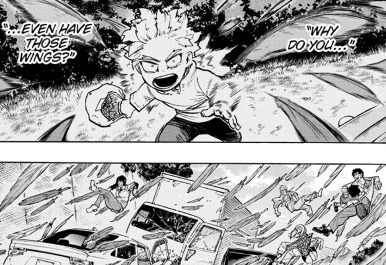
Because he learned when he was young the only way to be good was by sacrificing himself to protect others. He only received the help he needs because he showed he was “one of the good victims” but deep down internally he feels like he’s the bad one, for not being able to do anything for his mother, for not reaching out to her.
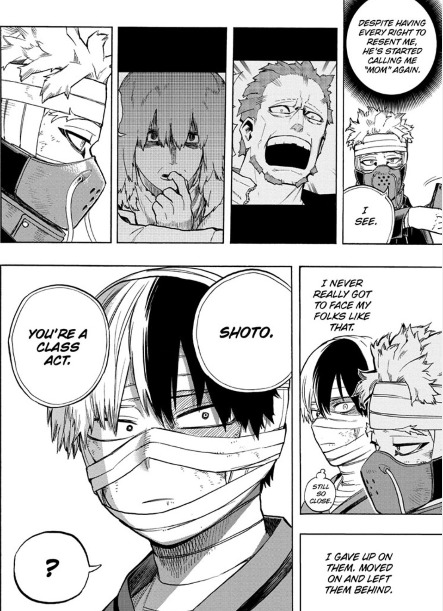
Hawks can’t see himself as a victim and it messes with the way he sees other victims as well. He divides them into good and bad, and then tells himself that he’ll offer to help the good ones, the ones willing to improve. Hawks’ represents Hero Society’s own willingness to throw the bad victims to the dogs.
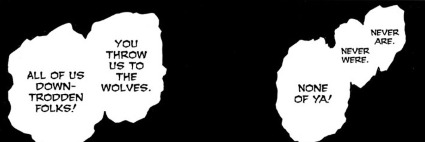
It’s specifically Hawks who Twice calls this out on. So we have a number one hero who thinks the only way to deal with villains is to violently suppress them, and the number two hero that thinks the only people who deserve to be saved is the ones he deems as “Good” or “Trying to be better.”
It’s all because Hawks has this really self destructive idea of what kindness is. That kindness is somehow destroying yourself for the sake of others, that it’s being overly forgiving and not holding any resentment at all.

It’s like how Deku acts like forgiving his father is a kind act. However, at the same time implying that holding onto resentment would be an unkind one.
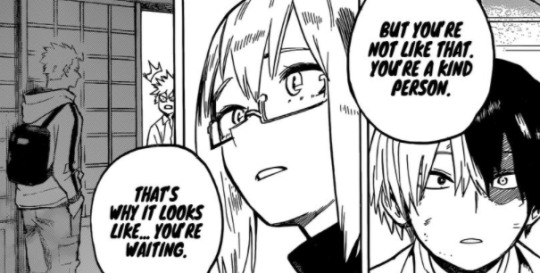
Even though the reason Natsuo won’t forgive is because Toya is dead, and Enji never showed any apparent remorse for it, and didn’t try to fix anything. Even though one son died because of Enji’s training, and then Enji just decided to train the one remaining son he had left a thousand times harder. Natsuo is attempting to hold his father accountable for his actions, but Deku acts like blanket forgiveness would be the kind thing to do.
Even though Deku himself is willing to overlook all of Enji’s past abuse of Shoto, and his murder of Toya, but at the same time stresses how unforgivable Toya and Shigaraki are.
Deku just saves people in a self destructive way. He breaks his bones to save others, thus mirroring Hawks who just saves people without genuinely thinking through who needs to be saved. They save people, because that’s the way they hurt themselves to prove how useful they are. However, neither of them actually goes through the trouble of thinking who genuinely needs saving, and that’s why they’re able to carry such a false double standard. Enji needs help because he’s trying to be better, whereas Toya’s not trying to be better. Ignoring the fact that you know, Enji tries to be better by just, forgetting everything he did in the past and sweeping his past actions under the rug, whereas Toya is still suffering from the scars of Enji’s abuse, permanently on his body.

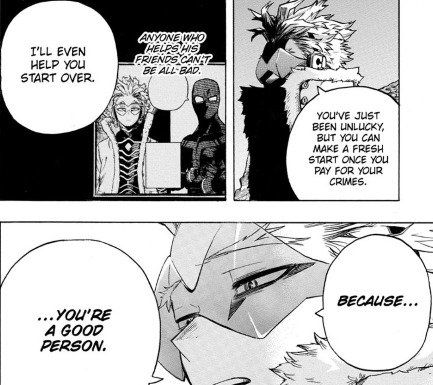
However, between Twice a person willing to die to protect his friends and act of complete selflessness, and Enji who can’t even bring himself to think that maybe he should try to save the son he let burn to death on a mountain peak which one do you think was trying to be better? Enji who spent ten years, even after Toya had already died to his training, training up Shoto instead even harsher. Enji who referred to Toya as “a failure” and “almost perfect” when talking to Shoto about his death.
“I’m going to help anyone trying to be better” is just an arbitrary line that Hawks draws.
That’s even the critique that Twice levelled at Hawks. Hawks doesn’t care because he never actually tried to see the good sides of the other people, but Toga was someone who comfotred Twice and understood him. Toga was someone who made the league feel like home. Hawks labels Twice as the only good one, because he just didn’t bother to see what was good about the other villains. Yet, at the same time he strains himself to see the good in Endeavor, to the point where he constantly apologizes for Endeavor’s actions and sweeps them under the rug. Endeavor is a good man who is just misunderstood in Hawks’ eyes, who just went wrong somewhere, but Hawks can’t ever offer up the same sympathy to the worst victims of society. Who lash out and hurt other people in the same way that Endeavor did, except Endeavor’s is excusable and there’s isn’t because...???
Hawks is in denial, because he refuses to look at the good sides of the villains. Twice didn’t choose to accept his offer of help, so obviously he didn’t want to be better, therefore Hawks is perfectly justified in putting him down. Notice though how Hawks mentioned prison time for Jin, but not for Enji (neglecting a child to the point where they burn to death is... still a crime).
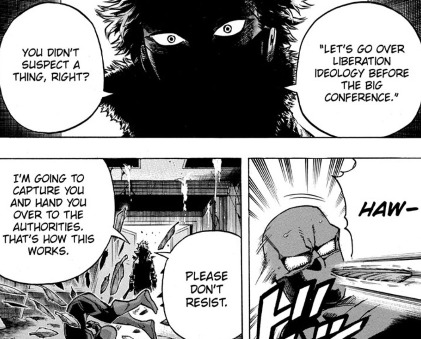
Hawks is still in denial about himself. He thinks he’s offering people a helping hand. However, from Jin’s perspective we see how manipulative he is. Hawks didn’t offer Jin a hand, he held him at gunpoint and told him to surrender and betray his friends. Hawks is just lying to himself, because he didn’t go out of his way to save Jin, he ruthlessly manipulated him, and then betrayed him. He’s not framed as a hero trying desperately to save a villain, but rather a friend betraying another friend who trusted him. Because, Hawks does not just sacrifice himself. He’s the extreme result of self sacrifice. Self sacrifice turns into self destruction. Self denial. Hawks sacrifices other people. He forces himself to dirty his hands, because he believes this is the only way he can be a hero. He’s too weak individually, so he has to manipulate, pull strings, and even kill in order to achieve the results he thinks will save the most people. However, by doing that he ignores the suffering of the victims right in front of them.
Not only that, but he ignores what contradicts his simple black and white narrative. Enji was trying to be better so he deserves help and support, Twice didn’t want to be better so Hawks revoked his offer of support away.

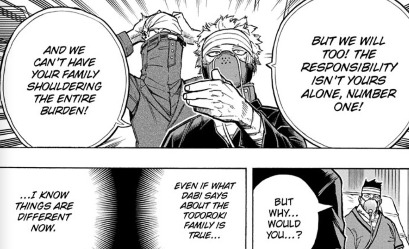
He’s willing to give support to a man who abused his family for no good reason, and who continues to evade any consequences or legal punishment for his actions, but then insists that Jin who was pushed to his actions by poverty and not wanting to starve to death just did not want to be better. He’s like, so unaware of what the problem actually is with society, he can’t possibly think why Enji leaving his own son to burn to death might have left his son a bit miffed. Enji is just a person who made a few missteps along the way but genuinely wants to be good, Dabi is just a selfish person who doesn’t want to be better, so says Hawks.
Nevermind how hard Toya tried to be a hero, and how he never gave up on earning his father’s love. Nevermind how hard Twice tried to be helpful to other, and how much he loved the people around him he was willing to sacrifice his life. Twice’s last action was to save his two closest friends. Enji’s actions are always just to beat up villains to prove how strong he is. Enji is never concerned with anyone. Hawks does want to save people, but he never thinks about the people who need to be saved.
Therefore, heroes are always good. Even when heroes do bad things, Hawks contrives some way to not hold them responsible for it ever. Well, Enji isn’t like that now. Well, we don’t need to announce that Enji was an abuser, because that will just upset the public.
The actions of Enji are apologized for over and over again. Because rather than holding him accountable for his actions. Instead of pushing him to actually fix his mistakes, it’s better to keep sweeping the problem under the rug. Because, as is repeated again and again heroes don’t save people. When a hero fails to save someone, rather than trying to fix that mistake it’s easier to blame the person who didn’t get saved.
Even if it was your own son that you left to burn to death. That is somehow miraculously alive. That has given you a second chance to save the person you should have saved that day by just, showing up, and actually acting like a father for once.
Enji will just choose his job over and over again. Because heroes don’t actually have a responsibility to save people. Being hero is just a job. Enji, Hawks, Jeanist they consider it a profession, not a responsibility. Which is why all three of them are willing to blame Dabi for his own actions, but not Endeavor for his. Which, just proves Dabi right.
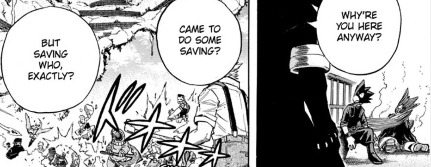
Heroes aren’t actually concerned with saving people. Heroes don’t think about who is most in need of saving, and who the real victims are. Heroes just protect their own.
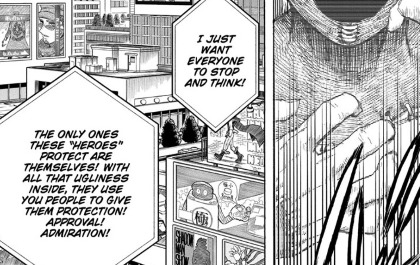
Enji, Hawks and Dabi are all murderers. They have all killed someone in pursuit of their goal. Not only did Enji murder a child by neglect, he also tried to kill Shigaraki several times over, and even tried to murder Pop Step in vigilantes. Hawks killed Twice in pursuit of a goal.
However, Hawks and Enji need to be supported, whereas Toya needs to be stopped. Because they are heroes, and Dabi is a villain. But sure, watch Dabi continually burn his own body over and over again and push himself to the very limit so he can achieve a society where another hero will never get away with abusing his family like Enji did his, and say that he doesn’t want to be good. Watch Toya burn himself over and over again as a child just trying to be a hero because he thinks it’s the only way to earn his father’s love, because he genuinely looked up to his father and wanted to be just like him, and insist that Toya just stopped trying to be better, that he was just a jealous child, that he was never good.
Jeanist isn’t a fully developed character so I’m not going to talk about him as much, but he represents the attitude that heroes “only pretend to save people” because they fuss ove image, rather than doing the actual work of helping victims.
The thing is someone who is genuinely trying to be better would listen to Dabi’s words, to Shigaraki’s words. However, Jeanist, Hawks, Enji all think of themselves as the hero, therefore they assume they are good and that their actions are good.
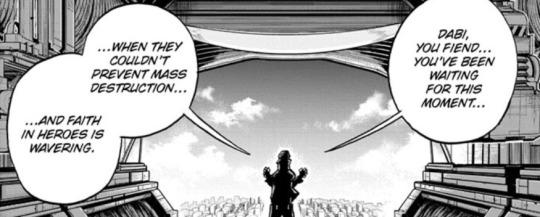
Whenever someone contradicts this, they just flat out ignore any criticism. Heroes don’t save people. Heroes just protect their own image as heroes, because they assume that’s what is necessary for peace. Even now, Hawks and Jeanist aren’t focused on the innocent people suffering from the victim break outs, but rather taking down the man out to ruin their reputations.
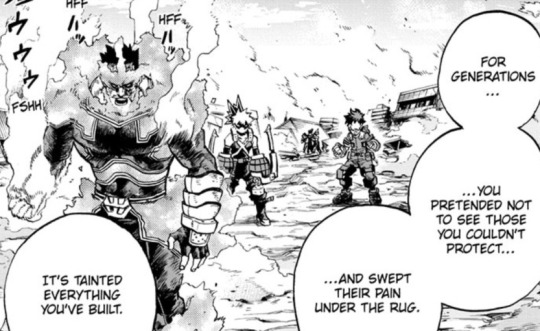
They pretend to see those they haven’t protected. Even when that person is Endeavor’s own son, his pain gets swept under the rug, because the image of Endeavor as a shining hero is far more important than the responsibility he has to help his own son, that’s in pain and need to saving.
#mha 303#mha 303 spoilers#bnha 303#bnha 303 spoilers#mha meta#hawks#takami keigo#endeavor#todoroki enji#best jeanist#dabi#todoroki toya
805 notes
·
View notes
Text
Class Disparity and Narrative Framing
Since a bunch of people liked my tags on this post, I thought I’d expand on this this topic.
I’m hoping we delve more into this once we get a proper backstory for Mr. Compress / Oji Harima, as it seems to be the basis for Harima’s actions in his era.
This was originally going to be just an analysis of how similar characters of different classes are treated by the narrative (specifically in regards to Ch 299) but want to first establish the role that class plays in the story overall.
Let’s start with the Peerless Thief (Oji Harima) and what we know of his ideology.
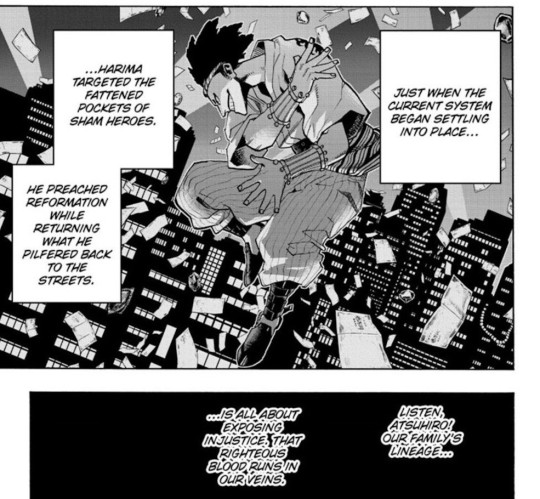
And his criticism isn’t unfounded. Heroes make a lot of money. And that’s in addition to the benefits they receive, such as medical care, education, internships. All free of charge. Once you become a hero, you’re pretty much set financially. That’s the main reason Ochako enrolls in UA, because she wants to help her struggling, working-class family.

But why did Harima find this system so unfair? If everyone has an equal opportunity to become a hero, where’s the harm in it being so profitable?
Except. Not everyone can become a hero. That is a fact Izuku had to contend with his entire childhood. For one thing, they need to have a quirk. So this eliminates the quirkless portion of the population automatically.
You need to also have a quirk that is useful in rescue & combat situations (eliminating more mundane quirks / quirks that have drawbacks that outweigh its ability) and a quirk that is marketable to the public (eliminating any quirks that are off-putting or unpalatable to people, such as Toga drinking blood or mutation quirks that aren’t “cute” or “aesthetically pleasing” enough to tolerate).
Essentially, you need to win the genetic lottery to get a quirk that qualifies you for heroism, an opportunity that offers a large degree of wealth and influence. And that’s where we get into the issue of class.
Class is defined as a group of people who share a socioeconomic status; and in BNHA, this is determined not only by birth, but also can be tied to quirks. The socio part is non-explanatory, as Izuku begins the manga showing how not having a quirk caused him to be treated differently by his peers.

The economic aspect of this is more subtle, but it’s started to come into focus with characters like Twice, Hawks and Compress.
Probably the reason Harima called for reform is this: Children inherit their quirks from their parents. Just as they inherit their socioeconomic status. Someone with a quirk that enables them to become a hero will not only pass on this wealth to their child, but also will likely pass on a quirk that would allow the child to pursue a hero career. This is why you see legacy heroes like Tenya, Shouto, etc.
This ensures that wealth remains in the family, generation after generation. Likewise, it can ensure that another family remains in poverty without any chance for mobility. In a sense, it’s the rich get richer while the poor get poorer.
Obviously, you have examples of mobility — Hawks and Ochako are the first that come to mind — but they had/have this opportunity because of their quirks.
Yes, you can still be a hero without the permission of the Hero Commission. Without a license, though, you will a) not be paid and b) be labeled a vigilante, which is the same as a criminal.
As an side-note, because I’m a nerd for words and history— in English, the origin for villain comes from the Medieval Latin villanus, or villa, a dwelling where poor farmers in the village would live. Yeah, that’s right: Villain used to just refer to a person of lower class. If you look at the etymology, many words with these connotations began as words associated with the poor. And in the hands of the aristocracy, they were effectively used to criminalize the poor.
And with that, we’ve circled back to the analysis of characters I promised at the beginning: Thief Takami and Enji Todoroki. Many have pointed out their similarity since Ch 299 was released. Rightfully so!
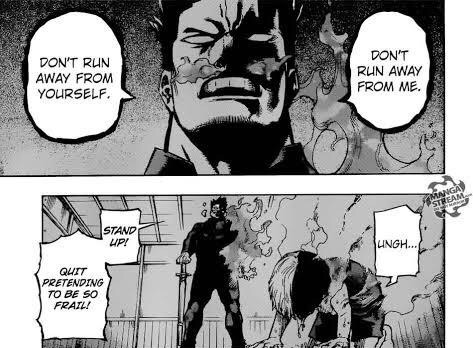

Both abused their children.

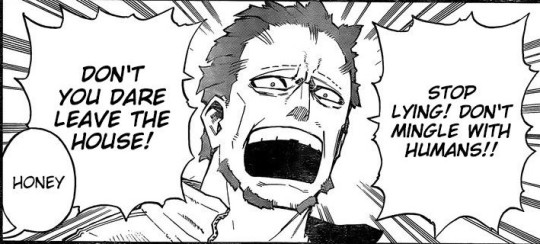
Both isolated their children.

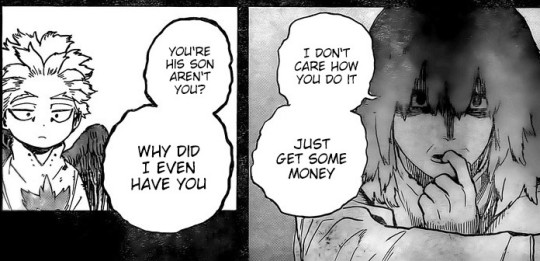
Both of their wives (idk if it’s confirmed Tomie was married to Takami but that’s essentially how they lived) viewed their children through the lens of their fathers due to the unhealthy relationships they had with their husbands.
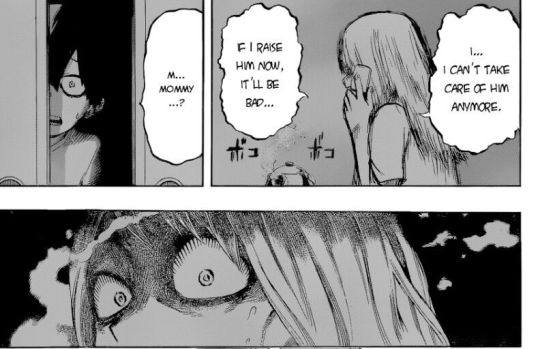
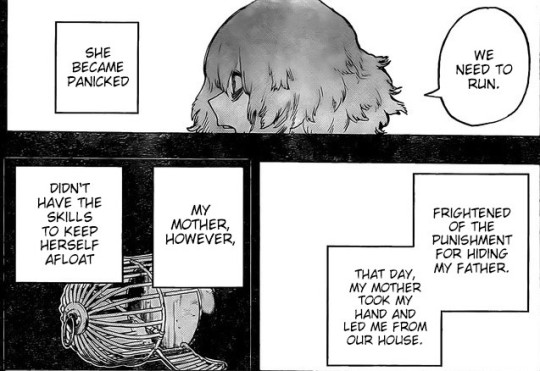
Both of the mothers were driven to a point where they couldn’t take care of their children, due to either the father’s presence/absence in the family.
What strikes me most in this comparison is how you can’t separate these characters from the issue of class. It permeates every panel and informs our understanding of their situations.
Takami is a piece of shit who blames his child for existing, something this poor kid had no control over. He views Keigo as a burden to him and his freedom and resents him for it.
The glimpses we get of the house show they live in squalor. A child is an extra mouth to feed, an extra person to provide for. You can’t examine the abuse without acknowledging the role of their nonexistent finances: Thief Takami was literally a criminal so he could get money.
Meanwhile, you have Endeavor, who is also a piece of shit, wrapped in a shinier package. He bought his wife with the intention of making children -- as many as needed -- so he could create the perfect combination quirk. Money was no object.
Expenses for Rei’s decade-long hospital stay, the nanny/housekeeper to care for the neglected kids, the fact he can so casually decide to build a new house for his family... It is never addressed by anyone in the story, because it doesn’t need to be. Money is no object.
I’m curious as to what class Rei’s family was (and I’m not exactly hopeful we’ll get this info, based on she’s been treated so far) that they agreed to this arrangement. If they were poor, the idea that their daughter would be taken care of financially might’ve enticed them. Hell, the idea that her family would be taken care of financially might’ve enticed Rei.
Through this analysis, I’ve also realized just how paranoid / concerned the Takamis act in comparison. Thief Takami isolates his whole family out of fear they will sell him out. Tomie is afraid she will be criminalized by mere association and chooses a life on the streets over the risk of going to the police.
Contrast this to how Shouto has revealed his father’s abuse to classmates he barely knew. How Fuyumi mentions in front of his friends who are interning under Endeavor that Natsuo blames their father for Touya’s death; later, Enji admits he is responsible. Remember when Endeavor flat-out told All Might, who was the most influential hero in the country at the time, that he created his son for the sole purpose of surpassing the Number One??

Yet the narrative gives this none of the weight it deserves. Because there are no stakes for Endeavor and everybody knows he will face no consequences for his crimes. The difference is that Takami & Tomie were well-aware that they would be punished if they were caught; while Endeavor & the Torodorkis are well-aware that he would not.
Suffice to say, it is telling that while the narrative has no qualms with condemning Thief Takami for his crimes and abuse of his family -- as it should -- it gives Endeavor the benefit of the doubt and chance after chance to prove he is “worthy” of redemption, even though his victims have never once denied his guilt and they certainly hold him accountable. And the only difference is that one man is from poverty while the other is from privilege.
Anyway, I could say more on this subject -- I would like to touch on how Ochako fits into the class discussion but this got longer than anticipated, so I may have to make a separate post for her -- but I’ll leave it at that for now.
235 notes
·
View notes
Note
Hi fren! Been following ur blog for a while and honestly I love it! I was wondering if I can get ur thoughts on something :)) remember in sozins comet when Iroh refused to fight ozai becuz “history will see it as more violence, a brother killing a brother to gain power” but then cue to Azula and Zuko who are fighting for the throne and it’s fine?? with them?? doesn’t that count as more violence as well? Thank if you ever come across this :D
Okay, first off, I think it needs to be clarified what Iroh actually said in that scene in regards to sending Zuko to defeat Azula because the two situations are very different and everyone involved knew that. The exchange went as such:
Zuko: Uncle, you’re the only person other than the Avatar who can possibly defeat the fatherlord.... we need you to come with us.
Iroh: No Zuko, it won’t turn out well.
Zuko: You can beat him. And we’ll be there to help.
Iroh: Even if I did defeat Ozai, and I don’t know that I could, it would be the wrong way to end the war. History would see it as more senseless violence: a brother killing a brother to gain power. The only way for this war to end peacefully is if the Avatar defeats the Firelord.
(dialogue, etc.)
Iroh: Zuko, you must return to the Fire Nation, so that when the Firelord falls, you can assume the throne and restore peace and order. But Azula will be there waiting for you.
When I see the argument that Iroh sending Zuko after Azula was hypocritical, I think it ignores the reality of the situation and the pragmatic approach. Because Iroh was absolutely correct throughout this whole exchange. Here were the facts as of this point:
1. Iroh and Zuko were declared traitors and could not legally assume the throne once Ozai was defeated, meaning Azula would assume the throne by default.
2. By this point in the series, Azula had shown at every point that she was just as enthusiastic about waging war and had shown no remorse for the suffering of the Earth Kingdom at the hands of the Fire Nation. She was particularly enthusiastic about the two major affronts against the Earth Kingdom: conquering Ba Sing Se and using Sozin’s Comet to burn down the Earth Kingdom.
3. Azula was the one who had the idea for the ‘let’s use the comet to burn down the Earth Kingdom’ plan in the first place and was proud of that plan. If Ozai was defeated, she would have used her position to go through with the plan anyway.
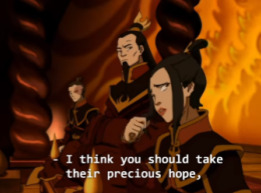

Realistically, this situation is in no way ideal, but the reality is that Azula did need to be stopped from assuming the throne. Make no mistake, if she had the opportunity to do so, she would have been at Ozai’s side burning down the Earth Kingdom instead of staying in the Fire Nation. She was dangerous and needed to be stopped and that was evident from her actions throughout the entire series.
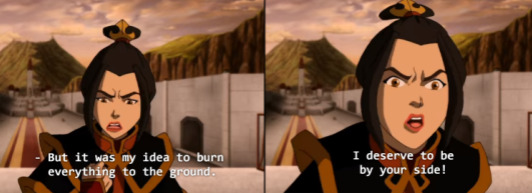
And the situations of Zuko defeating Azula and Iroh defeating Ozai are completely different, mainly because it was never Zuko or Iroh’s intention for Zuko to kill Azula like everyone else was planning with Ozai. The intent with Zuko going after Azula was to stop her from being crowned, which was a thing that needed to be stopped, otherwise, the war would have continued. And Iroh was absolutely correct in his assumptions: Zuko and Katara arrived in the Fire Nation just before Azula was crowned Firelord. And in the end, as we all know, they didn’t kill her, they just removed her as a threat so Zuko could assume the throne. There is a difference between taking out an actively harmful force in a position of absolute authority (Ozai) and stopping a harmful force from taking a position of absolute authority (Azula).
There’s also the facts that 1. Iroh had his own history as a general who held siege on Ba Sing Se for 600 days, allegedly committed war crimes, and wasn’t exactly well regarded in the Earth Kingdom. 2. Like he said, a fight between Iroh and Ozai was not one that had a clear victor. Iroh was not the right person to defeat Ozai, Aang was, for many reasons. (There’s also the fact that Iroh’s arc came full circle as he freed the city he once laid siege on, but that has less to do with the pragmatic rationale behind the match ups and more to do with thematic purposes.)
And this is a thing that also bothers me. There’s an argument that Iroh failed Azula and that part of the reason she was how she was fell on him and I don’t think that’s fair. And this post by @withyoutilltheendofthecredits articulates why:
the ideas “azula was a victim of abuse who was manipulated and hurt by ozai” and “azula had a hand in a lot of trauma for zuko due to her awful treatment of him” can and should coexist
I think it’s important to keep in mind whenever we talk about Iroh, Azula, and Zuko how their dynamic was in season 2. Firstly, Iroh’s priority through this show was to keep Zuko safe. In season 1, he wasn’t so much there to actively help Zuko find Aang (and on multiple occasions seemed to work against Zuko’s mission), but rather was there to stop Zuko from making stupid decisions that would get him killed while offering emotional support and training him to be a better firebender. Does he actually want Zuko to kidnap the Avatar and return to his awful, abusive father? No. But he does want Zuko to have something that gives him hope, something that keeps him going. And Iroh’s priority is to be there to make sure this kid doesn’t do anything too reckless.


In season 2, Zuko technically no longer has his mission as he’s deemed an enemy of the Fire Nation and Iroh more explicitly works to help his nephew mentally and emotionally extricate himself from the family members that hurt him. At the beginning of the season when Zuko is excited about going home after Azula lies to them, Iroh voices his suspicion because unlike Zuko, who’s still holding onto the idea that he can win his father’s love, Iroh is able to look at the situation objectively and knows that if Zuko goes home, he’s not going to be safe and he is not going to be met with any sort of love.
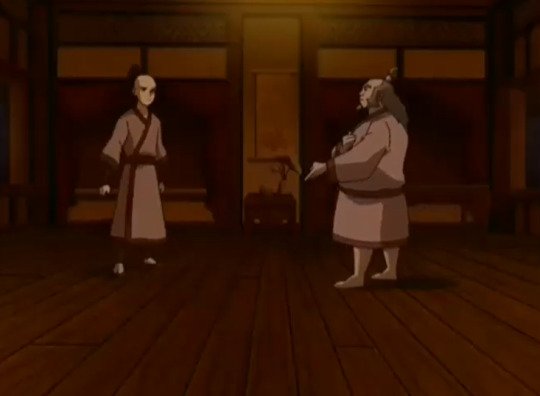
Zuko: Did you listen to Azula? Father’s realized how important family is. He cares about me.
Iroh: I care about you!
And through the rest of the season, Iroh tries his best to take advantage of their new freedom by showing Zuko that he does deserve control of his own life, happiness, and unconditional love. He’s trying his best to help him through this difficult time because part of Zuko’s emotional struggle in this is reconciling with the fact that no, his father doesn’t want him, at all. When he was banished, he had the ‘if I get the Avatar I can go home’ thing to cling onto, but Iroh and everyone else knew that Ozai never actually intended for Zuko to succeed or return. So Zuko has to deal with that in season 2 and doesn’t get to that point, he still tries to capture Aang and he still joins Azula in Crossroads of Destiny because he’s not ready to let that little bit of hope that he could return home go. It isn’t until he takes a stand against Ozai with the “it was cruel and it was wrong” speech that he really discovers who he is and what he wants and the main reason he’s able to come to that conclusion is because of Iroh’s treatment of him in season 2.
In season 2, Iroh not only protects Zuko from physical harm and takes care of him in regards to sickness, food, and water, but tries to drill into his head that he didn’t deserve the treatment from his father and shouldn’t throw his life away trying to please him. That he can have and deserves a peaceful life. And Zuko keeps going down the self destructive path because he’s been convinced for so long that him proving himself to his father is more important than his personal safety or happiness. Iroh just wants him to put himself before the man that abused him. He hates it that Zuko almost gets himself killed multiple times for the sake of Ozai. There’s their talk in The Avatar Day and their fight in Lake Laogai that bring this to the forefront:

Iroh: Even if you did capture the Avatar, I’m not so sure it would solve all our problems.
Zuko: Then there is no hope at all
Iroh: No Zuko, you must never give into despair.

Iroh: And then what?! You never think these things through. This is exactly what happened when you tried to capture the Avatar at the North Pole. You had him and then you had nowhere to go.
Zuko: I would have figured something out.
Iroh: No! If his friends hadn’t found you, you would have frozen to death!
Zuko: I know my own destiny.
Iroh: Is it your own destiny? Or is it a destiny someone else has tried to force on you?
And as Iroh acts as Zuko’s protector and tries to break him away from his self destructive mentality, how does Azula fit into that? Here are the interactions between Azula, Zuko, and Iroh in season 2:
Azula trying to take Zuko and Iroh as prisoners to the Fire Nation with no remorse
Azula attempting to shoot lightning at Zuko in the first episode of season 2 and Zuko only being saved by Iroh redirecting it at the last second
Azula shooting Iroh and seriously injuring him (it could have been lighting, but I think it was just fire)
Azula trying to capture Iroh and Zuko in Ba Sing Se and succeeding
Azula manipulating Zuko into going back to Ozai
Objectively, Azula is a threat against Zuko’s safety and there’s a good chance she would have killed him in the first episode of season 2 if Iroh hadn’t stopped her. He knows exactly how dangerous she is and made the decision that he was going to do what it took to keep Zuko safe, which he did. With this exchange in Bitter Work.
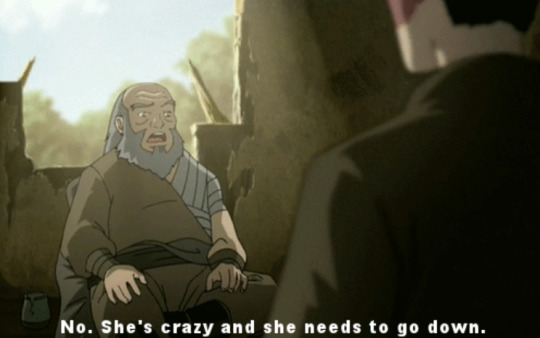
This isn’t Iroh saying ‘I have no sympathy for my niece whatsoever and am choosing to ignore her’. This is Iroh saying ‘Azula has proven herself to be an objective and real threat and I need to keep Zuko safe from her.’ And he was correct. I feel like this stance is reasonable when the last two times she saw them she tried to shoot Zuko with lightning and actually shot Iroh.

And the reality of the situation is that Iroh shouldn’t have had to be the one to raise Zuko or Azula. He wasn’t their parent and he shouldn’t have had to be responsible for them. Ideally, Ozai should have been the one to do that, but that wasn’t the reality of the situation. And Iroh was faced with a choice: go with Zuko who was banished, injured, and lost, or stay with Azula who was not in a good home with a good influence, but who was still the favored, prodigy princess. He had a choice of which kid to stand behind and I think it’s fair to say that Zuko needed Iroh more when he was banished.
Ideally, there shouldn’t have been a choice for Iroh. Ideally, Iroh shouldn’t have had to raise his nephew. Ideally, Azula should have had a better parental influence who didn’t encourage her violent streak. But it was by no means an ideal situation. Azula was dangerous and remorseless and Iroh was entirely correct when he saw her rising to power and realized ‘if she isn’t stopped now, there is no telling what she’s going to do’. Because he knows exactly who raised her.
1K notes
·
View notes
Text
Rashta, Navier and the true villain of The Remarried Empress
Listen, I don’t like Rashta. I don’t think I really need to explain why as most people clearly don’t. I think that she’s using very underhanded techniques to get what she needs and more. Because we all need safety and she comes from a place and status where she clearly need reassurance and that’s understandable. I find her annoying though because of the way she act and how she manipulate people. That’s my opinion. Navier clearly isn’t the only one she has hurt though so we can maybe stop using a sexist term like “Mary Sue” to describe her. The same way we need to watch our language about Rashta.
Now, I do believe that most of the hate should go on the Emperor even though it won’t because fandom is always more willing to hate on a “handsome” man rather than on any woman no matter how beautiful they are. Especially if they uses that beauty like Rashta does which was very common and still is. Not only is he the one truly being an ass to his wife, but he could have easily had people teach Rashta how to behave from the get go. Instead, he enjoys her ignorance because it satisfy his idea that he is this great person that everybody would love if they met. He cannot understand why Navier hasn’t fallen for him, despite not loving her himself, and need someone to reassure him that he is the gift to humanity he was probably told he was a thousand times growing up. He’s the true villain because he hurts both of the women, uses them to get what he wants, etc. For those that have read to the right part, let’s remember what is divorce plan actually is and how ridiculous it is.
I don’t think though that people should blame Navier for being “cold” (not that I’m seeing it here but still). She’s a young woman who was raised with an immense amount of pressure on her and she was probably taught that every single one of her actions have consequences. They actually do because whoever she talks to can be seen as favored and therefore will probably boast about it. The clothes she wear have an influence, her hair, etc. She can’t even unburden herself on anybody because that would be seen as weakness and as the Emperess she’s not allowed to have any. She has “everything” but not really because she is alone and not allowed to truly want or need for anything. Heck, people would probably talk if she were to express anything because how dare she need/want for anything, her who already has everything. She’s not even allowed friends that don’t work for her per her husband driving them away. She’s a bird that’s locked in a cage at all time and yet isn’t allowed to sing because it would make the free birds outside cry. She didn’t choose her life either, she was forced into it by her family.
That wasn’t my point while starting this though. I wanted to ask since when did slavery = bad become a hot take? I get that this is fiction, etc. but what is fiction but a reflection of our world and our values. Yes there are places were men can have multiple wives and mistresses and the women can’t say anything about it, but that’s not the case in South Korea. We’re also not talking about adultery. We’re talking about the very fact that somebody can “own” another’s life and impose their will and desire onto them. No matter if it’s fantasy or anything like it, it’s never okay. I don’t know in which universe people live but seeing an abject crime against humanity done and go “but it’s fiction” isn’t a good reasoning. The same way pure racism isn’t okay because of “fiction” or abuse isn’t okay for the same reason. I get that Rashta isn’t the most pleasant character but still. Especially since we are told here that she might be paying for someone’s else crime. Imagine how ridiculous that is. Your ancestor stole a loaf of bread or flirted with the wrong woman and the leader of your country decided that generations after them must pay for them. I know we are told that only a true “horrible” crime result in slavery but that all depend on the leader and their view of what categorizes a horrible crime. For some historical leaders, being born was a crime. That’s not counting a mad leader deciding to make their enemies disappear by selling them into slavery. Does someone really deserve to be treated as less than human because they or their parents did not agree with the political leader?
Rashta is a victim of that and is a villain sure but at least we have actual reason for her doing what she does. She evolved from the naive and trustable person we met at first, but how can she not when she’s trust in a political world with no idea how to swim in it. She’s also very much aware that her origin make her less in everybody’s mind around her. Now, does everything she does is okay or the right course of action? Of course not it isn’t. She quickly loses her innocence and start playing the game just like everybody else but she doesn’t deserve hate for that. The same way she doesn’t deserve hate for trying to survive in a world of sharks. It’s not a question of not trusting the Emperor, which she is right to do by the way seeing how he’s treated his wife and how others are treated for doing less than she is, but a question of trying to come out of all of it with her head on her shoulders and enough to live on. Does she eventually get greedy? Maybe and in my actual opinion yes, but she didn’t start wanting to steal a husband and a kingdom from someone else. Men are constantly manipulating her and using her for their own wishes and she can’t turn toward any of the ladies either because she is very much aware of how precarious her situation is. Unlike Navier, she can’t rely on being raised for the role of mistress or even her losing her status causing a political problem. She’s a nobody being used by rich men as a plaything and trying to not come out as a loser. She might be going at it wrong, but she was never taught how to do it right and you have to remember all the men that are filling her with lies and mistrust. Because pretty much every single of her “schemes” have come from a man telling her a lie or giving her a bad advice.
What I think is very interesting in this webtoon is the duality of Rashta and Navier because in a way, they end up in similar situations. They are both women that have to survive court and nobles being faker than plastic while men are trying to use them for their own gains and who have nobody to truly be able to turn to. Eventually, Navier gains people like that, but the tragedy of Rashta is that she doesn’t. She might think she can trust some people, but none of the people around her truly have her best interest at heart. The best thing for her would have been for Navier to take her under her wing while Rashta refuses to be the Emperor’s mistress (I can never remember his name sorry). By having the very same position that grants her the “security” she so need and desire, Rashta put her best ally in an enemy position and that’s what’s going to be her downfall. She might be annoying and pushing it sometimes, but we know she will drown because she’s never been taught otherwise. That’s why the true villain will always have to be the Emperor because he’s not only the one who pitted the two women by taking one as a mistress while married to the other one, but he never took the time to truly help his mistress, expecting others and especially Navier to do so for him. He could have brought her back to the palace as a guest only and Navier would have probably taken Rashta under her wing like she does for many others, but by making her a rival to Navier, he destroyed any chances she had to be able to leave him and survive which I think was something he did deliberately. There’s no way he wouldn’t have known that this would be the actual ending. He wanted to keep Rashta bound to him until he was done with her otherwise he would have asked Navier to help set her up with housing and maybe even a job. Instead, he probably held her status and her gender against her and decided to use her beauty for himself.
The lesson of this story in my opinion isn’t that beautiful women shouldn’t be trusted or that you have to be pure of heart and your history a blank slate to be worthy or anything like that but instead a lesson for women on who to trust and that we are stronger together than separated. It’s also a very clear lesson on how appearances can be wrong and it asks us the reader to truly wonder what makes someone a villain. Does wanting to survive in a hostile world make you one? Does not wanting to let someone take what is yours and what you have worked for your entire life does? Or does wanting to use others for your advantage, control them and force them to need you make you a villain?
#the remarried empress#tw: slavery#cw: slavery#navier#rashta#emperor i can't remember#Rashta isn't being painted in a good light for sure#but she's not the true villain of the story#she's not the real antagonist here#she's just another one of his victims
123 notes
·
View notes
Text
So, the encounter between c!Dream and c!Tommy in the prison was really interesting and I wanted to delve a bit deeper into it
So, we know Tommy is the first person to visit Dream (this is confirmed by both Dream and Sam, so I'd say it's accurate), which means Dream spent around a day alone in the cell, which is quite a bit.
Immediately when starting the conversation Tommy asks him if he missed him specifically, to which he immediately answers no, which contradicts something he said later on, when he listed Tommy among the people he missed when answering a more general question. Why is this important? Because Dream has been characterized as someone who mostly lacks empathy, he sees everyone as a pawn or a plaything, they aren't people to him, that said being in the prison is clearly a hindrance and the only person who visited him is Tommy. To convince Tommy to help him get out he needs to convince him he changed and regrets his actions, but he doesn't. He doesn't even know specifically which actions he's supposed to regret or what he's supposed to miss, which is why he does just fine when he can answer vaguely, but either his answers result unsympathetic or he gets upset when asked more specific questions.
Of course another thing we can understand from the first interaction is the tone this conversation will have: Tommy is trying to prod and provoke Dream and he's doing it because he needs to prove to himself that Dream doesn't have any more power over him, while Dream in response is trying to manipulate Tommy into believing he's a changed person so that he may be released in the near future.
They then have some general conversation and talk about the spawn trap mechanism that's keeping Dream trapped, but it's of little importance. Then Dream at one point says "Well I'm in prison now, so there's no reason for them to hate me anyway" which is quite important to, once again, showcase his lack of empathy. Because of course everyone has every reason to hate him after what he did to them, especially Tommy and Tubbo, but everyone else as well! Him getting a just punishment for his actions doesn't mean he's owed forgiveness by anyone. Dream though doesn't understand this because he can't empathize with the people he's hurt, he can't understand them.
Then it's Tommy's turn to say exactly why he's there: "Turns out I've had all the power over you all along, I just didn't know it" this is what he's trying to convince himself of. This, confirming this belief is the reason why he's here in the first place. It's the reason why he's taunting Dream and trying to annoy him to see if he'll retaliate, to see if Tommy really is free and in control now. But Dream of course doesn't concede, not once. Tommy went in with the idea of getting control back over his life, but now he has to go back again because Dream never once gave in.
Also one thing to notice is that multiple times during their interactions Tommy does sympathize with Dream. He has to remind himself out loud not to feel bad for him (with things like: "deserved... you deserve it") because Dream fully intended to do this to him after murdering his best friend in front of him just the day before. To further compare the two of them Tommy goes on a whole tirade repeating what Dream used to tell him in exile, clearly trying to get an emotional reaction, maybe an apology now that his abuser is in such a similar situation to what he was into, but Dream only repeats multiple times that he wants Tommy to visit him and ends it almost like an order: "Just visit me!". Once again Tommy is the one pushing and trying to make him empathize, but Dream doesn't, he has no empathy.
And now it's Dream's turn to reveal his intentions: "Maybe I'll be better and you'll let me out". Dream, for all his faults, tends to always be quite direct with Tommy when it comes to his intentions, though he does cover them up with layers of manipulation, he still does have a tendency to tell him out loud at the start. He did this during the exile as well. Everything he does in this meeting, especially from here on out, is in function of his objective. Tommy answers no at first but then, as soon as Dream insists a bit, he's suddenly confused, there is quite a bit of hesitation before he changes subject without responding. And Dream knows then that there is a possibility, he knows Tommy still cares and he can use it in his favour, because, to Tommy, their relationship is still incredibly confusing. Probably he still cares about Dream to some extent, which is perfectly fine and normal, it's actually very common for abuse victims to miss their abusers in some regards, but that's the reason why he really shouldn't be left alone with Dream.
We can see Dream immediately making use of this confusion he noticed as he doesn't loose a bit and apologizes right after that. And Tommy at first believes him, he utters the softest "really?" ever... but then he actually do a very smart thing and asks Dream to be specific, because if he really was sorry he could find at least one example of something he's sorry for. And here Dream falters, he gives the most general answer possible "I'm sorry for everything I did to you"... which means nothing and Tommy immediately starts to realize that, he actually fully realize it after he starts saying: "yeah but you could have said that last..." and realizes that it was just the night prior that Dream wanted to kill Tubbo and imprison him. This time Dream's manipulation doesn't work because Tommy realizes what he's doing.
"I can only help but not forgive you completely" the fact that Tommy still feels like he should help Dream really speaks volume about what kind of character he is. He's done some bad stuff in the past but he's most definitely one of the most empathetic and forgiving characters in the story, and, of course, there is the down side to that that he doesn't feel like he can completely abandon Dream, even after everything he's done to him. I mean, he said he wouldn't visit him every day because it took almost 50 mins just to get in, but he still planned to go in again 3 days after. Where Dream is incapable of empathy, Tommy has definitely too much of it.
Then there is the small bit with the books that Tommy says will help him forgive Dream, but, at this point, it's obvious he's just taunting him. Though it's very light hearted and Tommy can't bring himself to be too mean to Dream even in this situation. He does however realize that Dream is the one who needs to fix himself before anyone even starts thinking of forgiving him, so it's pretty good that he realizes that he doesn't have to forgive him immediately (he's not really under any obligation to ever forgive him, but Tommy tends to want to give people second chances).
And here we have the part with the biggest contradictions. Tommy offers Dream help (again, I don't think it's a good idea for them to be alone together) and he asks Dream how he's feeling, and Dream immediately starts contradicting some previous statements. At the beginning Tommy asked him if he was feeling sad, to which Dream answers no. Now, when the question is repeated, he immediately says he's feeling sad. He now has an objective and knows what he wants from Tommy and he's appealing at Tommy's extremely emphatic nature. Immediately after that he contradicts himself again by listing Tommy among the people he misses, contradicting his earlier statement. Also, once more, he's very vague in his answers (listing his friends, his things and the server as what he's lost, without being specific in any of the categories) the only thing he's specific about is Tommy who, coincidentally, just so happens to be the person he viewed as the key to get power. He doesn't care about any of the categories, he spent almost half the stream from yesterday explaining how he got rid of all his attachments, of course nothing changed in 24 hours! And we can see immediately that he doesn't really care as soon as Tommy asks a more specific question again: "Who do you miss the most?". Dream can't answer that question and he actually forces Tommy to leave after asking that. He can't answer because he doesn't miss anyone, he doesn't care about anyone. It's actually quite interesting that he has so much trouble with any of the specific questions, you'd think he'd know how to lie his way out of them, but no, he just finds himself with nothing to say, even when Tommy tries to give him an easy way out by mentioning Sapnap and George, Dream still doesn't know what to answer, because he doesn't care about them! He hasn't cared about either Sapnap or George in a very long time!
And just to remind Tommy that indeed he still isn't free of Dream's control, the last thing Dream does is telling Tommy to "get in the hole" knowing perfectly well that that will trigger the trauma he's caused him. If there was ever any doubt that he, in fact, doesn't actually regret anything, this clears it. Dream still has power over Tommy to a certain extent, be can still hurt him, he knows what his triggers are and knows how to use them and he's still trying to manipulate him. And if you're wondering if the phrasing was deliberate: yes, yes it was, he could have simply said "get in the water" like Sam did, but he didn't, because he's an ass.
So, in conclusion, neither Tommy nor Dream got what they wanted out of this encounter. Because, like Dream never gave Tommy control of the situation, Tommy didn't actually fall for Dream's manipulation. He didn't believe nor forgive him. Dream however did get Tommy to go to visit him again which is a partial win, maybe he'll be more ready for those specific questions next time.
Also can I just say I'm very happy that Tommy called out the clowns in chat who where sympathizing with Dream? You go child!
#dream smp#tommyinnit#dreamwastaken#pandora's vault#/rp#spoilers#analysis#character analysis#is it a character analysis or a relationship analysis?#I don't know#a bit of both I guess#tw manipulation#tw abuse mention#my post#long post#I really gotta learn how to make the continue under the cut thing
194 notes
·
View notes
Text
MAJOR spoilers for the C2 finale of Critical Role so read at your own risk of you haven’t caught up!
I have so many feelings regarding Caleb and Essek’s intertwining character arcs I needed to explore, so strap in folks, you’re in for a bit of a ride! (But seriously though, this is like 4000 words long, I basically wrote an essay 😂)
At the start of the campaign, Caleb Widogast was dripping in guilt and self loathing and refused to believe he could ever absolve himself of his sins. Essek Thelyss was a cold, aloof individual who betrayed his people for selfish goals, and their differing yet mirrored narratives have been an absolute delight to watch unfold.
In the beginning Caleb truly hated himself. He shot down any attempt at a compliment, described himself as a ‘disgusting person’, outright rejected the idea that he was worthy of love, and never let the blame shift from him for what he’d done. When Beauregard and Veth/Nott pointed out that he was coerced and manipulated into killing his parents, he reacts in an incredibly visceral way, and I’ve seen several comments likening it to a victim of child abuse who was groomed into believing they were as responsible as their abuser, and I think that’s exactly how it was meant to be read. He doesn’t see himself as a victim, only a murderer, and punishes himself for it every day. We see this in the way he presents himself, dirty and unkempt because in his mind he doesn’t deserve to feel good about himself in any way. Other than Nott/Veth and Beau to a certain degree, he purposefully isolates himself from the rest of the group and it’s a long time until he feels relaxed enough in their company to drop his defences a little.
(Speaking from a purely meta point of view, Liam did an absolutely phenomenal job of showing this through body language and I’d love to see someone do a compilation video of it. He starts off very hunched and guarded, leaning his body away from the closest person to him and avoiding eye contact and physical touch; but by the end stands tall and sure of himself.)
Early on there were a few moments where he had the option to do some pretty dark shit, and I’m sure there’s a possible timeline where he gave into his desire for revenge and really lost his way, but I’m glad he stuck it out and worked through his trauma in the way he did. His PTSD and disassociation when casting with fire was tragic, but over time he was able to work through it thanks to the constant love and support of his friends who kept him from going off at the deep end.
Molly’s death was the catalyst for change in a lot of the party, and Caleb is no exception. On the verge of leaving the group prior to his death, the grief they shared, combined with their frantic attempt to rescue the other half of their party put things in perspective and gradually he learned how to be a person again, to care.
Altering time to save his family had been Caleb’s only goal in life, and so when Essek and by extension, dunamancy was introduced, you could see his eyes light up at the possibilities.
A huge turning point for him is aligned so closely with Essek’s redemption arc which feels quite apt I think. When Essek confesses to his crimes, Caleb delivers a beautifully iconic piece of dialogue where he acknowledges their similarities and how much he himself has changed as a person since meeting the Mighty Nein. (Source - CR wiki)
‘You listen to me. I know what you are talking about. I know. And the difference between you and I is thinner than a razor. I know what it means to have other people complicate your desires and wishes. And I was like you. Was. I know what a fool I have been for years. You didn't account for us. Good. That is life. Shit hits you sideways in life and no one is prepared. No one is ready. These people changed me. These people can change you. You were not born with venom in your veins. You learned it. You learned it. You have a rare opportunity here, Thelyss. One chance to save yourself, and we are offering it.’
This is not the same Caleb we met back in the Nestled Nook inn way back in the first episode. While not yet fulfilled or entirely convinced of his own worth, he knows he’s on the right path. That alone is progress enough, but that he uses his own experiences to help another escape those same chains of guilt says such a lot for his development. When he tells Essek that his ‘venom’ was learned, he’s also talking about himself and his own history of being manipulated and gaslit, with the implication being that it can be un-learned just as efficiently.
Caleb Widogast is selfish no more, or at the very least, doesn’t let his goals undermine anyone else’s anymore. Contrary to what he himself might still think, he is in no way a bad person. He loves fiercely and cannot abide seeing those he cares about in pain.
Early game Essek is what Caleb could have been if he’d rejected his friends and focused solely on his own selfish goal to undo his mistakes. Both are impassive at first and see the Mighty Nein as means to an end...until they get to know them and then their fate is sealed. The Power of Friendship wins once again!
At the beginning Caleb said he wanted to ‘bend reality to my will’ (sic) and in the end he does just that, though not in the way he originally intended. Destroying the T-Dock, and by extension the one thing he’d been building towards from the start, the chance to go back and change time, for me personally was the absolute peak of his journey. I rewatched the scene where Caleb revealed the truth about his parents death today, and it was really jarring to see just how far he’d come since then. It made me oddly proud actually.
I always felt like his plan to save his parents was the one thing holding him back from truly accepting their deaths, which is why the final scene of him in the cemetery with the letters for them hit so hard. He never truly gave up hope that they’d be reunited, but ultimately he realised he was merely postponing the inevitable and never allowing himself to live his own life. While time travel shenanigans would have been incredibly interesting to explore in game, choosing to let the past lie and not go back for them finally allows him to grieve and move on, and perhaps most importantly of all, to forgive himself at last.
I know some people were annoyed by Caleb’s decision in the finale to spend the rest of his life teaching rather than continuing to adventure, but I see it as the natural conclusion to his whole arc and his own personal victory.
He looked Trent Ikithon in the eyes, a man who he’d spent years wanting to kill and run from in equal measure, stripped him of his power and his voice (and ultimately his ability to harm anyone else) and finally spared his life so he had to live with the indignity of his defeat for the rest of his miserable existence. You couldn’t have asked for a more damning rejection of everything he’d been brainwashed into believing as a child. His dismissal of Trent’s position in the Assembly played into that as well. He never really wanted power for the sake of it; he had no desire for politics, he just wanted his family back, and while he didn’t get the one he started with, he made a new one for himself in the end.
As Caduceus once very wisely said:
‘Pain doesn’t make people; it's love that makes people. The pain is inconsequential; it's love that saves them.’
Caleb gets to break the cycle of abuse and teach a new generation of mages the way he should have been, with kindness and respect, and I’m pretty sure he’d have introduced a handsome drow as a guest lecturer from time to time. 😉
Speaking of...
Essek described himself as selfish and as a coward, forever putting his own wants and desires first, yet over the course of his journey with the Nein we see his priorities change drastically.
Having friends gives him people to care about, something he’s never had before, and it changes his outlook on life completely. For me, the first time we really see this is when he joins them for dinner in the Xorhaus and stops levitating. It’s a subtle thing, but meaningful. He explains that it had become an expectation of him, a quirk he’s known for, and so to feel comfortable enough around the Nein to drop that pretence is quite bold I think.
Much later, when he chooses to destroy the mini beacon they discover in Aeor in order to give everyone a long rest before the final confrontation with Lucian, he’s essentially giving up everything he betrayed his people for, just to keep his friends safe. The existence and context of that single artefact could have had an earthshattering impact on the Dynasty’s entire culture, forcing them to reevaluate their entire belief system and attitude to the Luxon, something he’d wanted from the start, something he helped start a war for, but he offered it up as a sacrifice without a second thought.
I’d say that’s a pretty big morality shift, and I’m super interested to see if Matt reveals if his alignment changed in the post campaign Q&A. I have a feeling he set him up as a potential BBEG but the party was like ‘no, you can’t have him, he’s ours now’ and that was the end of that. 😂
I think it says so much about the other characters too, that they befriended this person they barely knew, and when he was revealed to have done such terrible things, their first reaction was to give him comfort and an opportunity to atone. Jester held his hand while he confessed, and afterwards, while they didn’t immediately forgive him, they saw the good in him and wanted him to be better, which ultimately feels like what the entire campaign was about, leaving places (and people) better than they found them. It’s obvious that he’s never really had many friends before and has therefore never had the opportunity to be emotionally open with anyone, so seeing him gradually warm up to the Nein and allow himself to soften around them was really lovely to watch.
(Obviously, from a realistic moral perspective, he still fucked up big time. He’s still a godsdamned war criminal and really should have been put on trial for what he did, but I think from a narrative and personal point of view, his redemption arc was far more satisfying, so I’m glad it happened the way it did. (And not to derail but the rest of the gang have done some pretty horrific stuff as well, though perhaps not quite on the same scale)
He has a few moments towards the end that I absolutely love because they show that beneath the guilt and anguish, there’s an incredibly sweet and sensitive soul in there, just wanting acceptance. His dry jokes which often don’t quite hit, (the ‘I will punish the bakery’ line is such an under-appreciated one 😂) his simple joy at learning to garden in the Blooming Grove, and realising that he’d never been asked what his favourite food was before was actually kind of heartbreaking, because it highlighted how lonely his life must have been until that time. There was a moment pretty early on I think when he cast disguise on the party and Jester asked if he could cast it again to change the look of her outfit a bit and while he seemed to find it amusing, he refused, not wanting to waste a spell on such a frivolous request. Cut to their time in Aeor where he burns a fly spell just so he and Caleb can flirtatiously swoop around each other for a couple of minutes, all the while trying to beat Lucian to the city.
His breakdown when Molly’s resurrection failed really cemented to me how much he’d grown as a character. He never met Molly, his only knowledge of him was secondhand, through the eyes of his friends, but seeing it fail just broke him because he knew how much it hurt them to go through it all over again.
His comment to Caleb about not admitting defeat and wishing he could do more did get me wondering at the time if he was going to try and do something crazy, perhaps sacrificing himself via the Temporal Dock to make amends or somehow forcing another reroll, but I’m glad he didn’t. The conversation following that with Fjord was one of my favourites- he shows him acceptance and belief in his potential for the future, something he’s lacked for a long time, and when Caleb bluntly affirms afterwards that he is indeed an official member of the Mighty Nein, it’s the start of the rest of his life, and something he’s exceptionally grateful for.
It all leads to that final moment in Aeor with Caleb, when, presented with the opportunity to alter time and undo everything, he chooses to accept his decisions and carry the weight of his sins for the rest of his long life. That’s...huge.
He’s essentially choosing to live the rest of his existence as a fugitive, forever on the run, with no guaranteed peace or safety. He chooses to spend his life making up for his deeds, rather than looking for an easy way out.
I think that may have had a big impact on why Caleb ultimately made the same decision, as if Essek had been up for altering his timeline I think he’d have struggled to resist it himself. The conversation they had earlier in Aeor about their priorities and resisting temptation really comes to mind as well.
Now, to the relationship.
It was subtle, and not as ‘in your face’ obvious as the other characters, but I’ve been watching and hoping for a long time and I must say, it feels good to be vindicated.
(And if you have any doubt, both Matt and Liam confirmed on Twitter that their post finale relationship was 100% romantic)
I’d been hoping that Shadowgast would be a canon endgame relationship for a while, so the finale, and the aforementioned T-Dock scene in particular had me quite literally shaking with emotion as I watched live. Here you have two men, both damaged and guilt-stricken in their own ways, who find in each other a kindred spirit and a path to redemption.
They’re both very guarded and closed off people, but Essek in particular has a definite shift in the last arc of the campaign especially when it came to his interactions with Caleb. At the start he was quite aloof and stoic, though charming, and they had an instant connection through their shared love of the arcane, (anyone who couldn’t see them making heart eyes at each other when Essek was describing the different types of magic he could teach Caleb was clearly blind) but by the end he was incredibly open to showing his vulnerabilities and that takes a lot, especially for someone whose primary focus was to stay in control of every aspect of his life. The ‘Caleb, I’m scared’ moment during the Trent fight in particular made my heart ache.
No, we didn’t get a dramatic declaration of love or a cinematic mid-battle kiss, but I’d argue that their relationship was just as, if not more intimate than any of the other main characters were. They understood each other in a way the others didn’t, their shared guilt, feelings of inadequacy and their obsession with magic forged a deep connection from the get-go. Neither of them are big fans of PDA I think, though Caleb is tactile as hell (forehead touches and kisses, oh man, I’m so weak for those 😩👌) and some of their most iconic moments have them putting themselves in harm’s way to protect the other. Essek shaking off his forced guilt trip immediately after the now infamous forehead touch in ep140 was beautifully poetic, as was using his fortune’s favour to pull Caleb out of the rubble moments before. Caleb trying to include him in his Sphere of Invulnerability in the finale and Essek staying close to him the whole fight despite being obviously terrified of Trent was the icing on the cake. It’s clear that they care for each other a great deal; whether by the finale they’d consider it love is up for debate, but we know that’s eventually where it ended up and honestly, I love that. I deeply appreciated the fact Matt and Liam both emphasised that they took their time with their relationship, letting each other heal in their own way before they took the next step. All too often in media, and real life too sadly, a romantic relationship is seen as some kind of quick fix, and that a lover will somehow complete you or make all your problems vanish. They knew this wasn’t the case here, and that made it all the better.
While I would have *loved* to have seen them together as a couple right to the very end, the change in their relationship felt right, if bittersweet. I doubt they ever stopped loving each other, and if anything, choosing to shift to a deep and lifelong friendship over a romance that would cause them both so much pain is one of the kindest things you could do for someone you love. After all, friendship isn’t a downgrade, just another way of experiencing that same love, and it wasn’t as though they broke up and never saw each other again, it was pretty strongly implied that they remained a major feature in each other’s lives, they just changed their label slightly. Caleb would hate to have forced Essek to watch him wither away, and although his eventual passing would hurt Essek regardless, incompatible lifespans being what they are, having a period of time to adjust to it, to give them a buffer between the inevitable heartbreak was actually really sweet.
Their romance was no accident, they knew going in that it had a time limit, that it wasn’t going to be forever for one of them, and the fact they did it anyway says so much. They began their adventure wholeheartedly believing that they were both, in their own way incapable of love, only to later find it with each other. Whether their relationship lasted for a couple of years or multiple decades is irrelevant, what matters is that while it did they had a happy and fulfilled life together.
I know some folk wanted Caleb to use the transmogrification spell on himself so he could live on with Essek as another elf, or make him human instead, but that would have been way out of character for both I think. If they could have backwards engineered one of the rejuvenation stations in Aeor and used it to extend Caleb’s life by a hundred years or so, so he’d have a similar lifespan to Veth, now, I could have seen him possibly doing that, so he could spend more time with his best friend too, but nothing further I think. He longed to be reunited with his parents too much to postpone death unnaturally like that.
That both Caleb and Essek ultimately chose to live with their mistakes and make peace with themselves was incredibly cathartic, and I couldn’t imagine it playing out any better.
The fact Matt has explicitly stated Essek is Demi too means so much to me personally because the latter is a label I’ve been identifying with a lot recently, and it’s so rare for aspec relationships to get any representation! It has honestly given me a lot to think about over the last few days, and I really appreciate it.
To conclude, here’s a bit of shameless self promotion. I wrote this after watching the finale and honestly feel like it sums up my feelings on the nature of their relationship pretty well.
‘A casual hand on a shoulder, a waist, a wrist; a gentle kiss placed on a forehead is common between them now, an intimacy born of trust and mutual affection. Over time it grows, like a fire born of seasoned timber; gradual and steady, no spluttering kindling that flares and sparks, but a slow burn, one which lasts.
Their love is embroidered into every aspect of their lives together. Acts of service, of comfort, of understanding.
Sometimes a kiss leads to more than a kiss, sometimes it doesn’t. Either way they are content.‘
So yeah, I love these two wizard boys so very much and I couldn’t be happier with the conclusion of their stories. ❤️
#Critical Role#Critical Role Spoilers#CR Spoilers#shadowgast#Essek thelyss#Caleb Widogast#C2ep141#C2ep141 spoilers#critical role finale
64 notes
·
View notes
Note
Re: your excellent recent metas on stanning Mako and semi-comparing/contrasting him with Katara, do you think Mako should have ever gotten his own TSR-style arc of seeking revenge on his parents’ killer? It’s something I’ve been thinking about ever since re-entering the ATLA/LOK fandom last year. Just, UGH, the wasted potential to use such an arc to really dig into Mako’s psyche and all the hardship he’s endured, and also make said hardship more front-and-center to his audience of antis who unfairly reduce him to a standoffish, philandering asshole. I understand not wanting to re-do TSR in LOK, but Mako deserved SOMETHING of that calibur for a character arc. What are your thoughts?
Oooooh this is a really good question, and it's something I hadn't really thought of before--which, I think, is part of the issue with LoK as a whole. If you'll forgive a bit of a tangent--in atla, we are constantly reminded about the losses that Sokka and Katara have suffered--not in any kind of heavy-handed way (no matter how much the Katara haters will whine about her mentioning their mother, even though they usually won't say boo about Sokka despite him mentioning their father at least as often)--because the narrative makes it very clear that it's something on their minds through everything else that happens. It shapes who they are, and informs a lot of the decisions they make. You can see this with Zuko, too, and the abuse he suffered from his father--even before it is revealed in The Storm, you know that something happened, and that maybe it's not such a great thing that he is desperate to 'regain' his honor and return home. And even Aang, though he only rarely is shown to actually grapple with it on screen, is a constant reminder to the world, as well as to the audience, of the consequences of the war, simply by virtue of being an airbender and the last living remnant of the Air Nomads.
By contrast, LoK doesn't do much with the traumas any of the main cast suffered, particularly not anything that happened prior to the start of the series. Mako has a deeply emotional conversation early on in the show about what happened to his parents, and what he witnessed as a small child, but nothing is ever made of this information. It provides a bit of context, and it allows fans like me who are dissatisfied with the way the show and fandom proceeded to treat him to dig deep and realize just how much he suffered and how much better he deserved--but as far as the show itself is concerned, that conversation was essentially flavortext. It doesn't mean much, the show doesn't seem interested in having Mako or Bolin reflect on their lives or even be shown to visibly mourn their parents (who never show up in so much as a single flashback). Even when they meet their paternal grandmother in book 3, nothing much is made of the connection (and when Bolin has to forcibly evacuate Yin from Ba Sing Se, she makes him wait for her to grab..... the picture of the dead Earth Queen, rather than the picture of her son and his family), other than Yin telling them why their father severed connection with his family and Mako choosing to give her his one memento of his parents.
And like... I get that was meant to be an emotional moment, but... his father chose to cut off all contact with his family. Whatever the reasons might have been, whether he might have changed his mind had he lived, the fact was that what he wanted from his life was to look to the future--to his wife (who he never bothered taking home to meet his parents) and to his children. I really don't think he would have wanted his mother to have his scarf instead of his son--especially not when she had memories of his entire life (adult memories!) to hold onto, while Mako only had the hazy memories of childhood and one physical token to cling to when those might not be enough.
Bolin is glad to suddenly have a huge family, when they meet their grandmother, but again... nothing really comes of this. At some point Bolin mentions that he used to dig through literal garbage for food, and this is played for laughs rather than taken as any kind of serious examination of his life before things changed. The show just doesn't care about the krew as individual characters, not really--they are moved about as needed for the Plot, jokes are occasionally made about their backgrounds, sometimes something is pulled out for an emotional tearjerker moment before never being referenced again (I mean, really, Grandma Yin is around for multiple episodes in book 3 and book 4, and neither Mako nor Bolin spend an episode just begging to hear about their father's childhood?), and... that's about it.
All of which is a very long-winded way of saying yes, I absolutely think that Mako should've gotten his own TSR-like episode. Obviously it shouldn't have been just a carbon-copy, or even necessarily occupy a similar niche in the show--while TSR is very much a Katara episode, it is also a Zuko and Katara episode, because whether you ship them or not, the episode is explicitly about not only Katara gaining closure for here mother's murder, but also about Katara working through her feelings regarding Zuko and choosing to forgive him. However, I absolutely believe that Mako should have been given a chance to confront his parents' murderer, and I think it's a crying shame that this never actually happened.
And the thing is, they wouldn't have even had to 'redo' TSR, any more than you consider Mako as a character to be a 'redo' of Katara just because they have similar childhood traumas--but what they very easily could have done is shown how that trauma lingers. Show Mako's complicated relationship with firebending (he really has no thoughts about his own element, when it is what killed his parents???) and with the Triads that he had to do work for to make ends meet as a teenager so that he could keep Bolin fed. Maybe he knows exactly which of the Triads was responsible for his parents' death--maybe the man's face is burned into his mind, appearing in his own nightmares so frequently he couldn't forget it if he tried.
Maybe he had to do a job for the man who killed his parents, and only the thought of Bolin going hungry or worse if Mako never came home kept him from attacking. Maybe that night, when he got home, after he made sure Bolin had something to eat and went to sleep, he threw up until there was nothing left in his stomach and then he kept retching, throat raw and eyes stinging, because every time he closed his eyes he saw that man's face and felt the hand that killed his parents clapping him on the back for a job well done.
Maybe the man who killed his parents is one of Amon's Triad victims, loses his bending and is pathetic and weak, and Mako struggles against the urge to roast him alive without a second thought. Maybe Korra is there, slowly putting the pieces together, wanting to speak up but knowing that this is Mako's pain and it's something she could never fully understand, believing with all her heart that he'll make the right choice... but still sighing with relief when Mako's shoulders slump, the fire goes out of his hands, and the man who killed his parents runs away.
Maybe, at the end of the book when she is restoring everyone's powers, the man who killed Mako's parents gets to the head of the line... and she refuses. Maybe that's ultimately his punishment. And maybe Mako is standing there, fists clenched against the still-simmering rage in his gut, teeth clenched against the urge to vomit, relaxing only when the man leaves--dejected, rejected and powerless--and smiling, because he can finally begin to heal and move on from the scars left behind by his parents' deaths, but the man who killed them will have to remember every single day for the rest of his life exactly why he's powerless.
Idk, I just think... it would really be neat if Mako had been allowed to get closure for what happened to his parents. It would be... neat. I'm not crying at all shut up.
#atla#lok#mako#mako meta#mako getting his own 'version' of tsr would honestly have been so good though#long post#devildogdemon#asked#lok critical
61 notes
·
View notes
Text
Hot Take: No one should be mad or questioning why someone doesn’t like a certain character or get mad when people criticize their favorite characters because people have a right to their own opinions and no one is saying these are facts. Or at least decent people shouldn’t be claiming their criticism is facts. When I say this I am talking about Chloe Price, Kenny from TWDG, and a bunch of other characters who are majorly liked by the fandom but ultimately you are shitted on if you don’t like said character or questioned. For example, I like Chloe and she is an amazing example of a tragic imperfect character but I am open to critiquing her because no one is perfect and she isn’t a perfectly written character. For example, no one should be afraid to come out and say they don’t like Chloe or that they have problems with her character because we all have different opinions and no one should be shitted on for having a different opinion. Personally, as much as my opinion has changed on Chloe from loving her to hating her to understanding her and empathizing with her, I don’t believe some of her behavior is okay but I know that isn’t who she is as a person. I know that she isn’t just a reckless, mean, sometimes selfish woman but I don’t need people telling me about all the crap she went through to excuse her bad behavior or her insensitive behavior. Same with Kenny because as much as I believe he is another great example of a tragic character who is losing himself to loss and pain and anger, I also believe that his character shouldn’t be praised for beating on teenagers and for shitting on people during his grief. The fact he wouldn’t help Lee look for Clem because he’s pissed at him and yeah he has every right to be pissed but his behavior and how he treated Lee over not agreeing with him. Yes, these choices matter to Kenny but similar to Chloe, he's stubborn as hell when he wants to do things and can barely listen to anyone else. I understand they both have lost shit, people, and live in harsh and brutal worlds and lives but if their behavior hurts people and their choices hurt and affect others their pain and past mean nothing. imo just because someone has a troubled past doesn't mean they deserve sympathy or that it excuses their bad behavior. Mr. Jefferson wouldn't be the way he was if he didn't have a fucked childhood. Nathan wouldn't act the way he does if he didn't have a troubled past and childhood. You don't excuse them so why is Chloe any different? You guys are so quick to ignore a villain's bad past if you deem them unlikeable but if you can romanticize them or relate them then it changes. But this is just my opinion, ultimately you shouldn't shit on people for not liking a character you deem relatable or that you can personally sympathize with. I don't like Kenny, his behavior and abuse towards teenagers scare me and this behavior isn't okay. But this is my opinion. Chloe needs a lot of work and imo I can sympathize with her and I don't believe she deserves the abuse or mindless hate she gets but she isn't perfect and I really wish we got to see her do bigger changes in the game but that's just my opinions. Just because you can sympathize with someone doesn't make their choices or shitty behavior that hurts others around them not good and because you have faith a character can give them another chance and save them doesn't mean they'll change. With anyone, you have to acknowledge your behavior hurts people and that your choices don't just affect you but those you care about. Chloe's behavior is understandable and I don't expect her to act perfect, people are allowed to have unhealthy behavior and express their feelings in whatever way they like but because of how deeply she feels she will do almost anything to have her feelings validated which they are but because she has trauma and is an abuse victim and she's not having the best life doesn't mean her behavior such as guilt-tripping will ever be okay.
12 notes
·
View notes
Text
Thank You, Disney Lucasfilm… For Destroying My Dreams
Warning: longer post.
~~~~~~~~~~~~~~~~~~~~~~~~~~~~~~~~~~~~~~~~~~~~~~~~~~~~
So… I watched The Rise of Skywalker on Disney+ a few weeks ago. Again.
Sigh.
I guess it has its good sides. But professional critics tend to dislike it and even the general audience doesn’t go crazy for it. I wonder why?
The Fantasy
When his saga became a groundbreaking pop phenomenon in the 1970es, George Lucas reportedly said that he wanted to tell fairy tales again in world that no longer seemed to offer young people a chance to grow up with them. The fact that his saga was met with such unabashed, international enthusiasm proves that he was right: people long for fairy tales no matter how old they are and what culture they belong to.
“Young people today don’t have a fantasy life anymore, not the way we did… All they’ve got is Kojak and Dirty Harry. All the films they see are movies of disasters and insecurity and realistic violence.” (George Lucas)
I’ve been a Star Wars fan for more than thirty years. I love the Original Trilogy but honestly it did not make me dream much, perhaps because when I saw it the trilogy was already complete. The Prequel Trilogy also did not inspire my fantasy.
The Last Jedi accomplished something that no TV show, book or film had managed in years: it made me dream. The richness of colorful characters, multifaceted themes, unexpected developments, intriguing relationships was something I had not come across in a long time: it fascinated me. I felt like a giddy teenager reading up meta’s, writing my own and imagining all sorts of beautiful endings for the saga for almost two years.
So if there’s something The Rise of Skywalker can pride itself on for me, it’s that it crushed almost every dream I had about it. The few things I had figured out – Rey’s fall to the Dark, Ben Solo’s redemption, the connection between them - did not even make me happy because they were tainted by the flatness of the storytelling reducing the Force to a superpower again (like the general audience seems to believe it is), and its deliberate ignoring of almost all messages of The Last Jedi.
Many fans of the Original Trilogy also were disillusioned by the saga over the decades and ranted at the studios for “destroying their childhood”. Now we, the fans of the sequels and in particular of The Last Jedi, are in the same situation… but the thought doesn’t make the pill much easier to swallow. What grates on my nerves is the feeling that someone trampled on my just newly found dreams like a naughty child kicking a doll’s house apart. Why give us something to dream of in the first place, then? To a certain extent I can understand that many fans would angrily assume that Disney Lucasfilm made the Sequel Trilogy for the purpose of destroying their idea of the saga. The point is that they had their happy ending, while every dream the fans of the Sequel Trilogy may have had was shattered with this unexpectedly flat and hollow final note.
I know many fans who dislike the Prequel Trilogy heartily. I also prefer the Original Trilogy, but I find the prequels all right in their own way, also since I gave them some thought. However, it can’t be denied that they lack the magic spark which made the Original Trilogy so special. Which makes sense since they are not a fairy tale but ultimately a tragedy, but in my opinion it’s the one of the main reasons why the Prequel Trilogy never was quite so successful, or so beloved.
Same goes for Rogue One, Solo, or Clone Wars. They’re ok in their way, but not magical.
The sequel trilogy started quite satisfyingly with The Force Awakens, but for me, the actual bomb dropped with The Last Jedi. Reason? It was a magical story. It had the spark again that I had missed in the new Star Wars stories for decades! And it was packed full of beautiful messages and promises.
The Force is not a superpower belonging solely to the Jedi Anyone can be a hero. Even the greatest heroes can fail, but they will still be heroes. Hope is like the sun: if you only believe in it when you see it you’ll never make it through the night. Failure is the greatest teacher. It’s more important to save the light than to seem a hero. No one is never truly gone. War is only a machine. Dark Side and Light Side can be unbeatable if they are allies. Save what you love instead of destroying what you hate.
Naively, I assumed the trilogy would continue and end in that same magical way. And then came The Rise of Skywalker… which looks and feels like a Marvel superhero story at best and an over-long videogame at worst.
Chekov’s Gun
“Remove everything that has no relevance to the story. If you say in the first chapter that there is a rifle hanging on the wall, in the second or third chapter it absolutely must go off. If it’s not going to be fired, it shouldn’t be hanging there.”
(Anton Chekov, 1860 - 1904)
If you show an important looking prop and don’t put it to use, it leaves the audience feeling baffled. There is a huge difference between a story’s setup, and the audience’s feeling of entitlement. E.g. many viewers expected Luke to jump right back into the fray in Episode VIII, because that’s what a hero does, isn’t it? The cavalry comes and saves the day. And instead, we met a disillusioned elderly hermit who is tired of the ways of the Jedi. But there was no actual reason for disappointment: in Episode VII it was very clearly said (through Han, his best friend) that Luke had gone into exile on purpose, feeling responsible for his failure in teaching a new generation of Jedi. It would have been more than stupid to show him as an all-powerful and all-knowing man who kills the bad guys. Sorry but who expected that was a victim to his own prejudice.
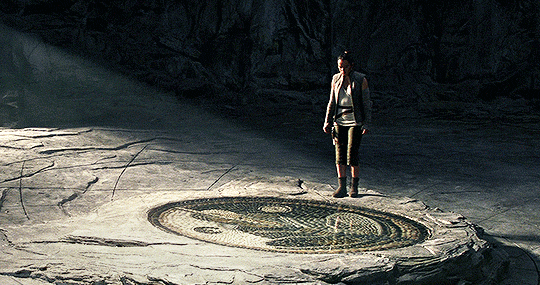
A promise left unfulfilled is a different story. The Last Jedi set up a lot of promises that didn’t come true in The Rise of Skywalker: Balance as announced by the Jedi temple mosaic, a new Jedi Order hinted at by Luke on Crait, a good ending for Ben and Rey set up by the hand-touching scene which was opposite to Anakin’s and Padmés wedding scene. Many fans were annoyed about the Canto Bight sequence. I liked it because it felt like the set-up for a lot of important stuff: partnership between Finn and Rose whom we see working together excellently, freedom for the enslaved children (one of whom is Force-sensitive), DJ and Rose expressing what makes wars in general foolish and beside the point. So if we, the fans of Episode VIII, now feel angry and let down, I daresay it’s not due to entitlement. We were announced magical outcomes and not just pew-pew.
The Star Wars saga never repeated itself but always developed and enlarged its themes, so it was to be expected that delving deeper, uncomfortable truths would come out: wars don’t start out of nowhere, and they don’t flare up and continue for decades for the same reason. In order to find Balance, the Jedi’s and the Skywalker family’s myths needed to be dismantled. Which is not necessarily bad as long it is explained how things came to this, and a better alternative is offered. The prequels explained the old political order and the beginnings of the Skywalker family, and announced that the next generation would do better. The sequels hardly explained anything about the 30 years that passed since our heroes won the battle against the Empire, and while The Last Jedi hinted at the future a lot, The Rise of Skywalker seemed to make a point of ignoring all of it.
The Skywalker Family Is Obliterated. Why?
Luke was proven right that his nephew would mean the end of everything he loved. The lineage of the Chosen One is gone. His grandson had begun where Vader had ended - tormented, pale and with sad eyes - and he met the same fate. Luke, Han, Leia, all sacrificed themselves to bring Ben Solo back for nothing. Him being the reincarnation of the Chosen One and getting a new chance should have been meaningful for all of them; instead, he literally left the scepter to Rey who did nothing to deserve it: merely because she killed the Bad Guy does not mean she will do a better job than the family whose name and legacy she proudly takes over.
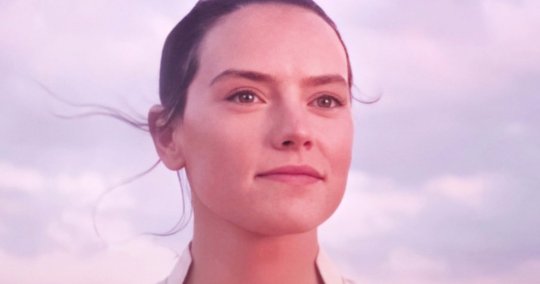
I do hope there was a good reason if the sequels did not tell “The New Adventures of Luke, Leia and Han” and instead showed us a broken family on the eve of its wipeout. It would have been much easier, and more fun for the audience, to bring the trio back again after a few years and pick up where they had left. Instead we had to watch their son, nephew and heir go his grandfather’s way - born with huge power, branded as Meant to Be Dangerous from the start, tried his best to be a Jedi although he wanted to be a pilot, never felt accepted, abandoned in the moment of his greatest need, went to his abuser because he was the only one to turn to, became a criminal, his own family (in Anakin’s case: Obi-Wan and Yoda) trained the person who was closest to him to kill him, sacrificed himself for this person and died. And in his case, it’s particularly frustrating because Kylo Ren wasn’t half as impressive a villain as Vader, and Ben Solo had a very limited time of heroism and personal fulfilment, contrarily to Anakin when he was young.
The impact of The Rise of Skywalker was traumatic for some viewers. I know of adolescents and adults, victims of family abandonment and abuse, who identified with Ben: they were told that you can never be more than the sum of your abuse and abandonment, and that they’re replaceable if they’re not “good”. Children identifying with Rey were told that their parents might sell them away for “protection”. Rey was not conflicted, she had a few doubts but overall, she was cool about everything she did, so she got everything on a silver platter; that’s why as a viewer, after a while you stopped caring for her. Her antagonist was doomed from birth because he dared to question the choices other people made for him. It seems that in the Star Wars universe, you can only “rise” if you’re either a criminal but cool because you’ve always got a bucket over your head (Vader / the Mandalorian) or are a saint-like figure (Luke / Rey).
One of Obi-Wan’s first actions in A New Hope is cutting off someone’s arm who was only annoying him; Han Solo, ditto. These were no acts of self-defense. The Mandalorian is an outlaw. Yet they are highly popular. Why? Because they always keep their cool, so anything they do seems justified. Young Anakin was hated, Jake Lloyd and Hayden Christensen attacked for his portrayal. For the same reason many fans feel that Luke is the least important of the original trio although basically the Original Trilogy is his story: it seems the general audience hates nothing more than emotionality in a guy. They want James Bond, Batman or Indiana Jones as the lead. Padmé loved Anakin because she always saw the good little boy he once was in him; his attempts at impressing her with his flirting or his masculinity failed. Kylo tried to impress Rey with his knowledge and power, but she fled from him - she wanted the gentle, emphatic young man who had listened to her when she felt alone. Good message. But both died miserably, and Ben didn’t even get anything but a kiss. Realizing that his “not being as strong as Darth Vader” might actually be a strength of its own would have meant much more.
The heroes of the Original Trilogy had their adventures together and their happy ending; the heroes of the Prequel Trilogy also had good times and accomplishments in their youth, before everything went awry. Rey, Finn and Poe feel like their friendship hardly got started; Rose was almost obliterated from the narrative; and Ben Solo seems to have had only one happy moment in his entire life. Of course it’s terrible that he committed patricide (even if it was under coercion), but Anakin / Vader himself had two happy endings in the Prequel Trilogy before he became the monster we know so well. Not to mention Clone Wars, where he has heroic moments unnumbered.
The Skywalker family is obliterated without Balance in the Force, and the young woman who inherited all doesn’t seem to have learned any lesson from all this. The Original Trilogy became a part of pop culture among other things because its ending was satisfying. We can hardly be expected to be satisfied with an ending where our heroes are all dead and the heir of their worst enemy takes over. What good was the happy ending of the Original Trilogy for if they didn’t learn enough from their misadventures to learn how to protect one single person - their son and nephew, their future?
For a long time, I also thought that the saga was about Good vs. Evil. Watching the prequels again, I came to the conclusion that it is rather about Love vs. War. And now, considering as a whole, I believe it to be essentially Jedi against Skywalker. The ending, as it is now, says that both fractions lost: they annihilated one another, leaving a third party in charge, who believes to be both but actually knows very little about them.
Star Wars and Morality
After 9 films and 42 years, it still is not possible to make the general audience accept that it is wrong to divide people between Good and Evil in the first place. The massive rejection of both prequels and sequels, which have moral grey zones galore, shows it.
It is also not possible without being accused of actual blasphemy in the same fandom, to say the plain truth that no Skywalker ever was a Jedi at heart. As their name says, they’re pilots. Luke was the last and strongest of all Jedi because he always was first and foremost himself. Anakin was crushed by the Jedi’s attempts to stifle his feelings. His grandson, too. A Force-sensitive person ought to have the choice whether they want to be a Jedi or not; they ought not to be taught to suppress their emotions and live only on duty, without really caring for other people; and they ought to grow up feeling in a safe and loving environment, not torn away from their families in infancy, indoctrinated and provided with a light sabre (a deadly weapon) while they’re still small. A Jedi order composed of child soldiers or know-it-all’s does not really help anybody.
The original Star Wars saga was about love and friendship; although many viewers did not want to understand that message. The prequels portrayed the Jedi as detached and arrogant and Anakin Skywalker sympathetically, a huge disappointment for who only accepts stories of the “lonesome cowboy” kind. The Last Jedi was so hated that The Rise of Skywalker backpedaled: sorry, of course you’re right, here you have your “hero who knows everything better and fixes everything for you on a silver platter”. The embarrassing antihero, who saves the girl who was the only person showing him some human compassion, can die miserably in the process and is not even mourned.
Honestly: I was doubtful whether it would be adequate to give Ben Solo a happy ending after the patricide. I guess letting him die was the easiest way out for the authors to escape censorship. (I even wrote this in a review on amazon about The Last Jedi, before I delved deeper into the saga’s themes.) The messages we got now are even worse.
Kylo Ren / Ben Solo
A parent can replace a child if they’re not the way they expect them to be. A victim of lifelong psychical and physical abuse can only find escape in death, whether he damns or redeems himself. An introspective, sensitive young man is a loser no matter how hard he tries either way. A whole family can sacrifice itself to save their heir, he dies anyway.
Rey
Self-righteousness is acceptable as long as you find a scapegoat for your own failings. Overconfidence justifies anything you do. You can’t carve your way as a female child of “nobodies”, you have to descend from someone male and powerful even if that someone is the devil incarnate. You are a “strong female” if you choose to be lonely; you need neither a partner nor friends.
In General
Star Wars is not about individual choices, loyalty, friendship and love, it is a classic Western story with a lonesome cowboy (in this case: cowgirl) at its centre. Satisfied?
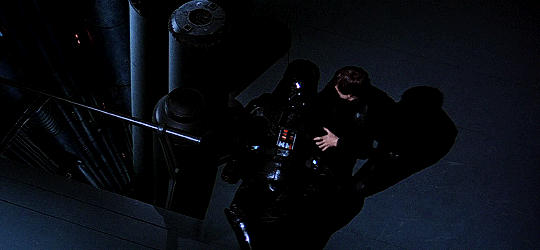
The father-son-relationship between Vader and Luke mirrors the Biblical story of Cain and Abel, saying that whoever we may want to kill is, in truth, our kin, which makes a clear separation in Good and Evil impossible. The “I am your father” scene is so infamous by now that even non-fans are aware of it; but this relationship between evil guy and good guy, as well as the plot turns where the villain saves the hero and that the hero discards his weapon are looked upon rather as weird narrative quirks instead of a moral.
In an action movie fan, things are simple: good guy vs. bad guy, the good guy (e.g. James Bond may be a murderer and a misogynist, but that’s ok because he’s cool about it) kills the bad guy, ka-boom, end of story. But Star Wars is a parable, an ambitious project told over decades of cinema, and a multilayered story with recurring themes.
A fairy tale ought to have a moral. The moral of both Original Trilogy and Prequel Trilogy was compassionate love - choose it and you can end a raging conflict, reject it and you will cause it. What was the moral of the Sequel Trilogy? You can be the offspring of the galaxy’s worst terror and display a similar attitude, but pose as a Jedi and kill unnecessarily, and it’s all right; descend from Darth Vader (who himself was a victim long before he became a culprit) and whether you try to become a Jedi trained by Luke Skywalker or a Sith trained by his worst enemy, you will end badly?
Both original and prequel trilogy often showed “good” people making bad choices and the “bad ones” making the right choices. To ensure lasting peace, no Force user ought to be believe that he must choose one side and then stick to it for the rest of his life: both sides need one another. The prequels took 3 films to convey this message, though not saying so openly. The Last Jedi said it out clearly - and the authors almost had their heads ripped off by affronted fans, resulting in The Rise of Skywalker’s fan service. It’s not like Luke, Han and Leia were less heroic in the Sequel Trilogy, on the contrary, they gave everything they had to their respective cause. They were not united, and they were more human than they had once been. Apparently, that’s an affront.
The Jedi are no perfect heroes and know-it-all’s and they never were, the facts are there for everyone to see. Padmé went alone and pregnant to get her husband out of Mustafar - and she almost succeeded - although she knew what he had done and that he was perfectly capable of it (he had told her of the Tusken village massacre himself) because she still saw the good little boy he had been in him; Obi-Wan left him amputated and burning in the lava, although he had raised Anakin like a small brother and the latter had repeatedly saved his life. But Padmé was not a Jedi, so I guess she still had some human decency. Neither Obi-Wan nor Yoda lifted a finger for the oppressed populations of the galaxy during the Empire, waiting instead for Anakin’s son to grow up so they could trick him into committing patricide. Neither Luke nor Leia did anything for their own son and nephew while he became the scourge of the galaxy, damning his soul by committing crime after crime. On Exegol, Rey heard the voices of all Jedi encouraging her to fight Palpatine to death. After that, they left her to die alone, and the alleged “bad guy”, who had already saved her soul from giving in to Palpatine’s lures, had to save her life by giving her his own. The Jedi merely know that “their side” has to win, no matter the cost for anyone’s life, sanity, integrity or happiness.
Excuse me, these are simple facts. How anyone can still believe that the Jedi were super-powerful heroes who always win or all-knowing wizards who are always right is beyond me. Luke, the last and strongest of them, like a bright flickering of light before the ultimate end, showed us that the best of men can fail. There is nothing wrong with that in itself. But it is wrong and utterly frustrating when all of the failure never leads to anything better. If Rey means to rebuild the Jedi order to something better than it was, there was no hint at that whatsoever.
And What Now?
The Last Jedi hit theatres only 2 years before The Rise of Skywalker, and I can’t imagine that the responsible authors all have forgotten how to make competent work in the meantime; more so considering that Solo or The Mandalorian are solid work. Episode IX is thematically so painfully flat it seems like they wanted us to give up on the saga on purpose. The last instalment of a 42-year-old saga ought to have been the best and most meaningful. I had heard already decades ago that the saga was supposed to have 9 chapters, so I was not among who protested against the sequels thinking that they had been thought up to make what had come before invalid. I naively assumed a larger purpose. But Episode IX only seems to prove these critics perfectly right.
The last of the flesh and blood of the Chosen One is dead without having “finished what his grandfather started”?
Still no Balance in the Force?
And worst of all, Palpatine’s granddaughter taking over, having proven repeatedly that she is not suited for the task?
Sorry, this “ending” is absurd. I have read fanfiction that was better written and more interesting. And, most of all, less depressing. I was counting on a conclusion that showed that the Force has all colours and nuances, and that it’s not limited to the black-and-white view “we against them”. That’s the ending all of us fans would have deserved, instead of catering the daddy issues of the part of the audience who doesn’t want stories other than those of the “lonesome cowboy” kind. I myself grew up on Japanese anime, maybe that’s one of the reasons why I can’t stand guys like James Bond or Batman and why I think you don’t need “a great hero who fixes the situation” but that group spirit and communication are way more important.
It was absolutely unexpected that Disney, the production company whose trademark are happy endings and family stories, would end this beloved and successful saga after almost half a century on such a hollow note. Why tell first a beautiful fairy tale and then leave the audience on a hook for 35 years to continue first with a tragedy (which at least was expected) and then with another (unexpected one)? And this story is supposed to be for children? Like children would understand all of the subtext, and love sad, cautionary tales. Children, as well as the general audience, first of all want to be entertained! No one wants to watch the legendary Skywalker family be obliterated and a Palpatine take over. The sequels were no fun anymore; we’ve been left with another open ending and hardly an explanation about what happened in the 30 years in between. If you want to tell a cautionary tale, you should better warn the general audience beforehand.
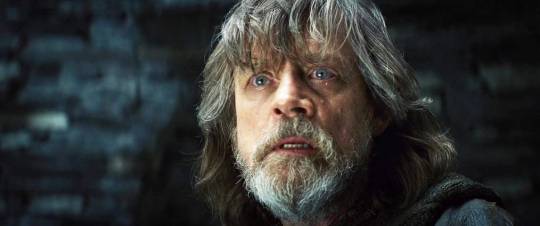
The Original Trilogy is so good because it’s entertaining and offers room for thought for who wants to think about its deeper themes, and also leaves enough space for dreams. Same goes for the first two films of the Sequel Trilogy; but precisely the last, which should have wrapped up the saga, leaves us with a bitter aftertaste and dozens of questions marks.
We as the audience believe that a story, despite the tragic things that happen, must go somewhere; we get invested into the characters, we root for them, we want to see them happy in the end. (The authors of series like Girls, How I Met Your Mother or Game of Thrones ought to be reminded of that, too.) I was in contact with children and teenagers saying that the Sequel Trilogy are “boring”; and many, children or adults, who were devastated by its concluson. There is a difference between wanting to tell a cautionary tale and playing the audience for fools. This trilogy could have become legendary like the Original Trilogy, had it fulfilled its promises instead of “keeping it low” with its last chapter. Who watches a family or fantasy story or a romantic / comedic sitcom wants to escape into another world, not to be hit over his head with a mirror to his own failings, and the ones of the society he’s living in. Messages are all right, but they ought not to go at the cost of the audience’s satisfaction about the about the people and narrative threads they have invested in for years.
This isn’t a family story: but children probably didn’t pester the studios with angry e-mails and twitter messages etc. They simply counted on a redemption arc and happy ending, and they were right, because they’re not as stupid as adults are. I have read and watched many a comment from fans who hate The Last Jedi. Many of these fans couldn’t even pinpoint what their rage was all about, they only proved to be stuck with the original trilogy and unwilling to widen their horizon. But at least their heroes had had their happy ending: The Rise of Skywalker obliterated the successes of all three generations of Skywalkers.
If the film studios wanted to tease us, they’ve excelled. If they expect the general audience to break their heads over the sequels’ metaphysics, they have not learned from the reactions to the prequels that most viewers take these films at face value. Not everybody is elbows-deep in the saga, or willing to research about it for months, and / or insightful enough to see the story’s connections. Which is why many viewers frown at the narrative and believe the Sequel Trilogy was just badly written. This trilogy could have become legendary like the Original Trilogy, had it fulfilled its promises instead of “keeping it low” with its last chapter. As it is now, the whole trilogy is hanging somewhere in the air, with neither a past nor a future to be tied in with.
The prequels already had the flaw of remaining too obscure: most fans are not aware that Anakin had unwillingly killed his wife during the terrible operation that turned him into Darth Vader, sucking her life out of her through the Force: most go by “she died of a broken heart”. So although one scene mirrors the other, it is not likely that most viewers will understand what Rey’s resurrection meant. And: Why did Darth Maul kill Qui-Gon Jinn? What did the Sith want revenge for? Who was behind Shmi’s abduction and torture? Who had placed the order for the production of the clones, and to what purpose? We can imagine or try to reconstruct the answers, but nothing is confirmed by the story itself.
The sequels remained even more in the dark, obfuscating what little explanation we got in The Rise of Skywalker with quick pacing and mind-numbing effects.
Kylo Ren had promised his grandfather that “he would finish what he started”: he did not. Whatever one can say of this last film, it did not bring Balance in the Force. What’s worse, the subject was not even breached. It was hinted at by the mosaic on the floor of the Prime Jedi Temple on Ahch-To, but although Luke and Rey were sitting on its border, they never seemed to see what was right under their noses. It remains inexplicable why it was there for everyone to see in the first place.
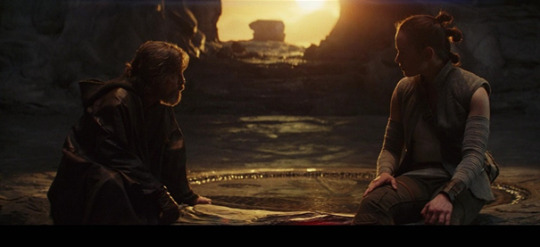
We might argue that Ben finished what his grandfather started by killing (or better, causing the death of) the last Jedi, who this one couldn’t kill because he was his own son; but leaving Rey in charge, he helped her finish what her grandfather had started. The irony could hardly be worse.
Episode IX looks like J.J. Abrams simply completed what they started with Episode VII, largely ignoring the next film as if it was always planned to do so. We, the angry and disappointed fans of The Last Jedi, may believe it was due to some of the general audience’s angry backlash, but honestly: the studios aren’t that dumb. They had to know that Episode VIII would be controversial and that many fans would hate it. The furious reactions were largely a disgrace, but no one can make me believe that they were totally unexpected. Nor can anyone convince me that The Rise of Skywalker was merely an answer to the small but very loud part of the audience who hated The Last Jedi: a company with the power and the returns of Disney Lucasfilm does not need to buckle down before some fan’s entitlement and narrowmindedness out of fear of losing money. And if they do, it was foolish to make Rey so perfect that she becomes almost odious, and to let the last of the Skywalker blood die a meaningless death. (Had he saved the Canto Bight children and left them with Rey, at least he would have died with honor; and she, the child left behind by her parents, would have had a task to dedicate herself to.)
The only reason I can find for this odd ending is that it’s meant to prepare the way for Rian Johnson’s new trilogy, which - hopefully - will finally be about Balance. We as the audience don’t know what’s going on behind the doors. Filmmaking is a business like any other, i.e. based on contracts; and I first heard that Rian Johnson had negotiated a trilogy of his own since before Episode VIII hit theatres. Maybe he kept all the rights of intellectual property to his own film, including that he would finish the threads he picked up and close the narrative circles he opened, and only he; and that his alleged working on “something completely different” is deliberately misleading.
Some viewers love the original trilogy, some love the prequels, some like both; but I hardly expect anyone to love the sequel trilogy as a whole. What with the first instalment “letting the past die, killing it if they had to”, the second hinting at a promising future and the third patched on at the very last like some sort of band-aid, it was not coherent. I heard the responsible team for Game of Thrones even dropped their work, producing a dissatisfying, quickly sewn together last season, for this new Star Wars project and thereby disappointing millions of GoT fans; I hope they are aware of the expectations they have loaded upon them. George Lucas’ original trilogy had its faults, but but though there was no social media yet in his time, at least he was still close enough to the audience to give them what they needed, if not necessarily wanted. (Some fans can’t accept that Luke and Leia are siblings to this day, even if honestly, it was the very best plot twist to finish their story in a satisfying way.)
I’m hoping for now that The Last Jedi was not some love bombing directed at the more sentimental viewers but a promise that will be fulfilled. “Wrapping up” a saga by keeping the flattest, least convincing chapter for last is bad form. Star Wars did not become a pop phenomenon by accident, but because the original story was convincing and satisfying. Endings like these will hardly make anyone remember a story fondly, on the contrary, the audience will move to another fandom to forget their disappointment.
On a side note, I like The Mandalorian, exactly for the reason that that is a magical story; not as much as the original trilogy, but at least a little. Of course, I’m glad it was produced. But it’s a small consolation prize after the mess that supposedly wrapped up the original saga after 9 films.
We’re Not Blind, You Know…
- Though Kylo Ren (Ben Solo) has Darth Vader’s stature, his facial features are practically opposite to Vader’s creepy mask. This should have foreshadowed that his life should have gone the other way, instead of more or less repeating itself. - As a villain Kylo was often unconvincing; by all logic he should have been a good father figure. (Besides, Star Wars films or series never work unless there is a strong father or father figure at their center.)
- Like Vader, Kylo Ren was redeemed, but not rehabilitated. Who knows who may find his broken mask somewhere now and, not knowing the truth, promise “I will finish what you started”. - The hand-touching scene on Ahch-To which was visually opposite to Anakin’s and Padmé’s should not have predicted another tragedy but a happy ending for them. - The Canto Bight sequence was announcing reckoning for the weapon industry and freedom for the enslaved children. It also showed how well Finn and Rose fit together. - Rey was a good girl before she started on her adventures. Like Anakin or Luke, she did not need to become a Jedi to be strong or generous or heroic. - Rey summons Palpatine after one year of training. Kylo practically begged for his grandfather’s assistance for years, to no avail. Her potential for darkness is obviously much stronger. - Dark Rey’s light sabre looked like a fork, Kylo’s like a cross. - The last time all Jedi and Sith were obliterated leaving only Luke in charge, things went awry. Now we have a Palpatine masquerading as a Skywalker and believing she’s a Jedi. Rey is a usurper and universally cheered after years of war, like her grandfather. - The broom boy of Canto Bight looked like he was sweeping a stage and announcing “Free the stage, it’s time for us, the children.”
Rey failed in all instances where Luke had proved himself (so much for feminism and her being a Mary Sue): - Luke had forgiven his father despite all the pain he had inflicted on him. She stabbed the „bad guy”, who had repeatedly protected and comforted her, to death. - Luke never asked Vader to help the Rebellion or to turn to the Light Side, he only wanted him back as his father. She assumed that you could make Ben Solo turn, give up the First Order and join the Resistance for her. She thought of her friends and of her own validation, not of him. - Luke had made peace by choosing peace. Rey fought until the bitter end. - Luke had thrown his weapon away before Palpatine. Rey picked up a second weapon. (And both of them weren’t even her own.) - Luke had mourned his dead father. Rey didn’t shed a tear for the man she is bonded to by the Force. - Luke went back to his friends to celebrate the new peace with them. Rey went back letting everyone celebrate her like the one who saved the galaxy on her own, she who were tempted to become the new evil ruler of the galaxy and had to rely on the alleged Bad Guy to save both her soul and her body. - Luke had embodied compassion when Palpatine was all about hatred. Where he chose love and faith in his father, she chose violence and fear. - Luke had briefly fallen prey to the Dark Side but it made him realize that he had no right to judge his father. Rey’s fall to the Dark Side did not make her wiser. - Rey has no change of mind on finding out that she’s Palpatine’s flesh and blood, nor after she has stabbed Kylo. Luke had to face himself on learning that he had almost become a patricide. Rey does not have to face herself: the revelation of her ancestry is cushioned by Luke’s and Leia’s support. Rey is and remains an uncompromising person who hardly learns from her faults.
This is cheating on the audience. And it's not due to feminism or Rey being some sort of “Mary Sue” the way many affronted fans claim. Kylo never was truly a villain, Rey is not a heroine, and this is not a happy ending. The Jedi, with their stuck-up conviction “only we must win”, have failed all over again. The Skywalker family was obliterated leaving their worst enemy in charge. Rey is supposed to be a “modern” heroine which young girls can take as an example? No, thank you. Not after this last film has made of her. Padmé was a much better role model, combining intelligence with strength and goodness and also female grace. The world does not need entitled female brats.
Bonus: What Made The Rise of Skywalker a Farce
- The Force Awakens was an ok film and The Last Jedi (almost) a masterpiece. The Rise of Skywalker was a cartoon. No wonder a lot of the acting felt and looked wooden. - “I will earn your brother’s light sabre.” She’s holding his father’s sabre. - Kylo in The Last Jedi: “Let the past die. Kill it if, you have to.” Beginning with me? - Rey ends up on Tatooine. - The planet both Anakin and Luke ardently wanted to leave. - Luke had promised his nephew that he would be around for him. - Nope. - Rey had told Ben that she had seen his future. What future was that - “you will be a hero for ten minutes, get a kiss and then die? (And they didn’t even get a love theme.) - “The belonging you seek is not behind you, it is ahead.” On a desert planet with a few ghosts. What of the ocean she used to dream about? - Ben and Rey were both introduced as two intensely lonely people searching for belonging. We learn they are a Force dyad, and then they are torn apart again. - Why was Ben named for Obi-Wan Kenobi in the first place, if they have absolutely nothing in common? - The Throne Room battle scene in The Last Jedi was clearly showing that when they are in balance, Light Side and Dark Side are unbeatable. Why did the so-called “Light Side” have to win again, in The Rise of Skywalker, instead of finding balance? - Luke’s scene on Ahch-To was so ridiculously opposite to his attitude in The Last Jedi that by now I believe he was a fantasy conjectured by her. (Like Ben’s vision of his father.) - Anakin’s voice among the other Jedi’s. - He was a renegade, for Force’s sake. - The kiss between two females. - More fan service, to appease those who pretended that not making Poe and Finn a couple was a sign of homophobia. - We see the Knights of Ren, but we learn absolutely nothing about them or Kylo’s connection with them. - Rose Tico’s invalidation. - A shame after what the actress had gone through because for the fans she was “not Star-Wars-y” (chubby and lively instead of wiry and spitfire). - Finn’s and Rose’s relationship. - Ignored without any explanation. - Finn may or may not be Force-sensitive. - If he is: did he abandon the First Order not due to his own free will but because of some higher willpower? Great. - General Hux was simply obliterated. - In The Force Awakens he was an excellent foil to Kylo Ren; no background story, no humanization for him. - Chewie’s and 3PO’s faked deaths. - Useless additional drama. - The Force Awakens was a bow before the classic trilogy. The Rise of Skywalker kicked its remainders to pieces. - The Prequel Trilogy ended with hope, the Original Trilogy with love. The Sequel Trilogy ends on a blank slate. - “We are what they grow beyond.” The characters of the Sequel Trilogy did not grow beyond the heroes of the Original Trilogy. - The Jedi did not learn from their mistakes and were obliterated. The Skywalker family understood the mistakes they had made too late. Now they’re gone, too.
P.S. While I was watching The Rise of Skywalker my husband came in asked me since when I like Marvel movies. I said “That’s not a Marvel movie, it’s Star Wars.” I guess that says enough.
P.P.S. For the next trilogy, please at least let the movies hit theatres in May again instead of December. a) It’s tradition for Star Wars films, b) Whatever happens, at least you won’t ruin anyone’s Christmases. Thank you.
#star wars#disney#disney lucasfilm#star wars sequels#the force awakens#the rise of skywalker#rey palpatine#kylo ren#ben solo#reylo#bendemption#luke skywalker#anakin skywalker#darth vader#marvel movies#finn#rose tico#george lucas#obi-wan kenobi#yoda#the mandalorian#rogue one#clone wars#han solo#leia organa#anton chekov#read more#the last jedi#sw
419 notes
·
View notes
Text
Dabi the Villain, Touya the Victim
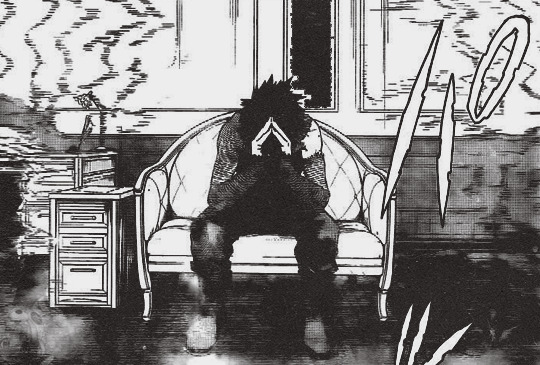
That no.1 title you’ve always wanted is a lot of pressure, huh? Has your heart been purified with all the praise you’ve received from the public? Does your newfound vigor as a father figure to your children, make you feel like you’re developing a ‘familial bond’ with them? You seriously thought if you could keep your eyes towards the future the past would forget itself would you? It’s time for someone to give you a life lesson - (RHA SCANS).
The past doesn’t forget. Dabi doesn’t forget. Scars may fade with time but Dabi’s won’t, they’ll only get worse and worse as he continues to burn himself using his quirk. Dabi arrives at literally the single worst time possible, to throw salt in old wounds, and stick his fingers in them for good measure. It’s clear, Dabi’s revenge is just going to make things worse for everyone, including his family, including Shoto.
However that begs the question, if not now, then when? This was always going to happen. I don’t mean ‘abusive families have to air their dirty laundry in live television’ I mean, there was always going to be some consequence to what Endeavor did to his family. Dabi is a monster, yes, but in-story he’s a monster of Endeavor’s creation. Dabi wouldn’t even exist without Endeavor’s direct actions. He’s a reflection of every bad thing Endeavor has done up until this point and everything he needs to face. The number one hero created the number one worst villain.
1. The Shadow
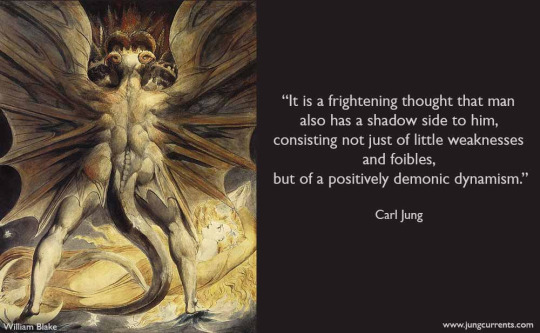
Dabi is more than just a murderer, he’s also a jungian archetype. The shadow is a jungian idea that states on the whole we are not as good as we think we are. In fact, we actually might be much worse.
The shadow is either an unconscious aspect of the personality that the conscious ego does not identify in itself; or the entirety of the unconscious, i.e., everything of which a person is not fully conscious. In short, the shadow is the unknown side.
To put it into simple terms how we perceive ourselves, what we are aware of the light, is the conscious mind.
Everything else, everything we’re unaware of, what we’re ignoring, how we might come off to others, the unintended consequences of our actions is the shadow we cast. This isn’t something I”m making up it’s directly referenced in story.
The approach of the villains have multiple times been compared to shadows stretching and growing deeper, this is Jungian symbolism.



The emperor of Fallen Light, the villain that Dabi himself sent after Endeavor said word for word “His shining Light beckons the dark.” This is a story idea that’s been set up for awhile, Endeavor’s light is a false light. He is a good hero, the best there is currently, but calling him a hero requires ignoring everything he has done to his family. Most of the people who call Endeavor a hero have no idea what he did to his family, and even most of his family is just trying to forget and move on with their lives.
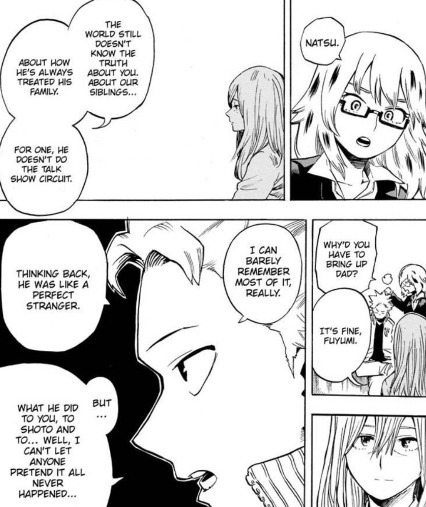
Endeavor’s redemption so far has been a false one, it hinges on everybody else wanting to just move on with their lives, and everyone else being forgiving towards his actions. I’m not saying that Endeavor’s wish to atone isn’t genuine, I’m saying the story has been setting up an arc of false light. We are shown the light of his actions, his desire to redeem himself, his desire to be a hero that Shoto can look up to, and we ignore the shadow.
There’s a duality to Endeavor. Technically there’s a duality to everyone. There’s the light, and the dark. To put it in less abstract terms, even within good intentions there can be hidden bad intentions. A person who gives to charity might just be doing it to make themselves feel like they’re a good person. There’s even an episode of friends about this, Phoebe gets in an argument with somebody that even “charitable” deeds like giving awaay money can be a little selfish because helping others makes you feel good about yourself, so she tries the whole episode to find a truly selfless action.
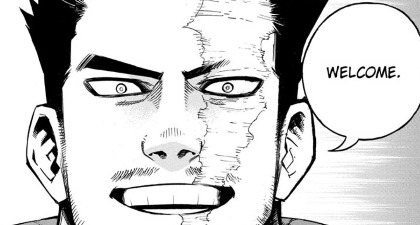
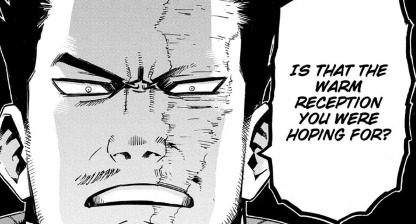
There’s a duality to Endeavor, there are two Endeavors, Endeavor the hero, and Endeavor the bad dad. They are both Endeavor in the end, he is all of his good actions and bad actions. Focusing only on his bad actions, or only on his good actions would be an incorrect reading of his character.
What I’m saying is, this idea has been building up in the story for a long time. This duality in Endeavro’s character. He is a hero capable of villainous things. However, the public, Endeavor’s own family, and characters like Midoriya and All Might only really ever see the good side to Endeavor’s actions. They all look at the light, at Endeavor the hero.

For the most part Endeavor has not been confronted by consequences for his actions. Yes, Endeavor tries to listen when Natsuo expresses his hurt feelins. Yes, Endeavor realizes his family might want to live without him in the house. However, as opposed to Dabi who has been hated as a villain by all of society for the crimes he has committed, Endeavor is still getting the hero treatment. The worst Endeavor has to come against is his own children’s hurt feelings at his actions. Even then, Natsuo has somebody like Fuyumi constantly pushing him to try to reconcile with his father. He has Endeavor violating his boundaries, and hugging him. Rather than criticizing Endeavor for what he did, most of the criticism falls on Natsuo for not moving on. Like, what Endeavor did is just something that happened in the past that they all have to move on from. He still has the respect of his peers, he still has his position in society, he still has the title of Number One Hero.
This happens because everybody looks at Endeavor, and they’re all blinded by the light, they only see his good deeds and not his bad ones. This isn’t a post debating whether or not Endeavor earned or deserves his punishment, or whether require punishment, it’s just an argument that there are consequences to your actions. That’s Dabi. He’s consequences. Everyone around Endeavor has been repressing their feelings. The Todorokis are asked to repress their personal hurt over the past for the sake of moving forward.
Dabi is the shadow that Endeavor casts. There is a villain in Endeavor’s actions. As long as Endeavor ignores that, as long as he keeps seeing himself in only a heroic life, that villain is only going to manifest elsewhere. In a story, repression does not work, simply ignoring your problems does not work. If a character ignores their shadow that shadow manifests and takes on a life of it’s own.
Dabi is a response to those repressed feelings. Not only is he a repsonse to them, he’s an inevitable result of them. No child abuse doesn’t usually turn abuse victims into murderers. That’s also, not the point. The point is this is a story, Endeavor tried to just bury the past, and Dabi, rose from the grave and said “No, I don’t think the past is better off buried. I think we should talk about it.”
2. The Monster
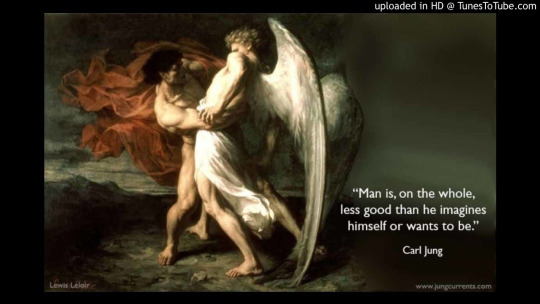
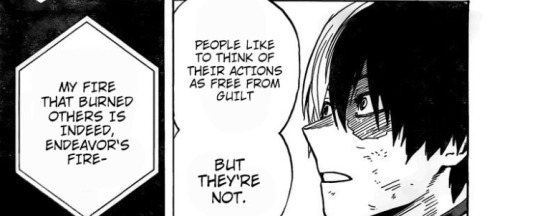
“People like to think their actions are free from guilt but they’re not-” This is once again more Jungian symbolism. People want to believe they are on the whole good and well-intentioned people. People want to believe they are better than they are.
Dabi has been hurt. Burned even. While Endeavor only looks at the best of himself, his heroic intentions, his ambition to become number one, Dabi sees not only the worst in himself, but the worst in his father, the worst in everyone.
The reason people identify with Dabi is not because they think murderers are sexy (but let’s admit it they are) it’s because Dabi as a character is made up of hurt feelings. He has been burned. He doesn’t forgive the people who burned him. He represents a darker, rawer side to human emotion. Sometimes abuse doesn’t make people poor innocent victims, it’s just pain, sometimes nothing constructive or good comes out of it. Sometimes it’s just damage, to you, and everybody around you.
Putting aside the fact that he’s a murderer (hey I acknowledged it, look at me acknowledging it), Dabi is also written as a character to embody the worst parts of abuse. The negative emotions that Dabi feels are real. Dabi’s hurt feelings are just as real, as the good intentions and desire to forgive that family members like Fuyumi and Shoto have. Neither is more valid, more real than the other.
However, everyone looks at the light, and the shadow is ignored. Dabi’s hurt feelings haven’t even been acknowledged. Not only that, but the feelings of all people hurt tend to get swept under the rug for the sake of “everyone else.”
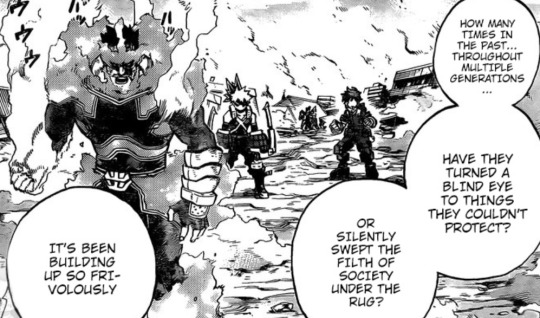
When Shigaraki says Heroes have turned a blind-eye to the suffering of others, he doesn’t mean that heroes don’t try their hardest to save people, or that heroes never save people. He’s saying that the characters in the story are repressing their issues instead of confronting them, and repression makes people ignorant instead of being able to truly address the problem. Now, connect that back to Dabi, who is the shadow of his father’s actions.
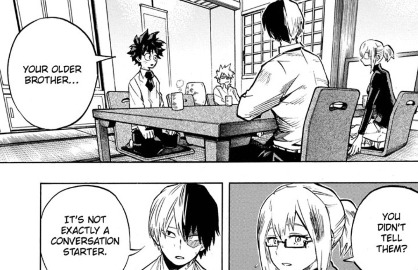
Toya himself is someone in the story who has been “forgotten.” We see Fuyumi praying at his shrine, as well as Endeavor, Natsuo can’t bring himself to forgive Endeavor because of his feelings over Toya. Yes, yes, yes. However. One, the number one hero had his son die and nobody even investigated into those situation. Two, nobody even talks about it nowadays. Shoto brings up his older brother’s death at the dinner table like it’s just an awkward subject he’s uncomfortable talking about... not you know, a tragedy.
And I’m not saying that Shoto is in the wrong here. I don’t mean to demonize his response. I’m suggesting he’s repressed. He’s repressing his hurt feelings about the brother he never got a chance to meet, his two other siblings, his mother, all of that to continue to work with his father because he wants to move forward with his dream, and probably because if he tried facing all of that it would hurt a lot.
However, it’s still the tendency of all the characters on the heroic side to repress things, and look at that from Dabi’s point of view. His own family members don’t even recognize him because of a few scars on his face.

It’s lonely. At the very least it’s lonely and serves to isolate Dabi in his grief further. Push him to believing that he really did die alone and was going to get forgotten, that his survival is just a hindrance that prevents everything in his family from moving forward. Dabi is made up of hurt feelings, and Dabi without prejudgice takes out those feelings on other people. However, Dabi is still a person. The same way Endeavor is both hero and villain, Dabi is both villain and victim at the same time. Dabi was a ten year old who didn’t really do anything wrong who died, after being ignored by his father his whole life. Dabi is, a zombie that’s barely alive, and constantly killing himself with his own quirk. Dabi’s pain is impossible to ignore, and yet he feels ignored.

The difference between Dabi and Endeavor is that Dabi is living as a villain, he acknowledges that he is a villain. He’s the only one in the league to show genuine remorse for killing people, crying a tear of blood and trying to dissociate his own feelings of guilt and the past from himself to the point where he remarks he’s going ‘crazy’ thinking about it. (That doesn’t make it okay, but since when is anything ever okay with the Todorokis?) You have a character who knows exactly what he did wrong, confronting a character who for the most part still sees hismelf as a hero.

Endeavor still sees himself as a hero in this situation. Dabi lives confronting the worst parts of himself (well he’s barely alive but still), he’s stich together scar tissue, and is covered in wounds. He is everything bad that has happened to him. But still, Dabi is at least AWARE.
Beyond all the other plot details, what he’s doing right now is confrontation of something that Endeavor was previously ignorant of. It’s the crux of Dabi’s speech to Endeavor. What he’s saying is pointing out the dark side of each of Endeavor’s good actions.

Endeavor becomes the number one hero, which means he finally gets all the praise, acclaim and honor he always thought he was entitled to. This doesn’t mean that Endeavor’s wish to become strong to serve as a supporting pillar for the nation was a lie, but what Dabi says also isn’t a lie either. It’s the hidden dark side of Endeavor’s actions which Endeavor does not acknowledge.
Endeavor wants to move on and act like a father to his children like twenty years after the fact, and coincidentally this also happens right after being handed everything he wanted on a silver platter. Dabi is pointing out, the negative sides of Endeavor’s actions. Aren’t you just being nice because you’ve gotten everything you’ve wanted now? Don’t you just think you deserve to have your children love you too?
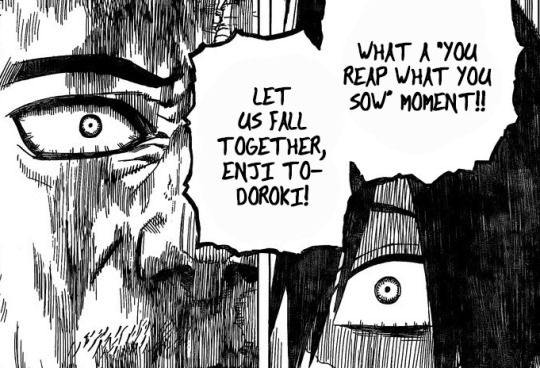
Dabi is confronting Endeavor with the dark sides of actions so he can no longer remain blind, and he is literally in story an agent of the cosnequences of Endeavor’s actions. Dabi became a villain because Endeavor had a son for the sake of his own selfish desire to get stronger, cast him aside, and then even let Toya die. Even if Endeavor wants to move past that, Toya doesn’t. Because for Toya that defines his whole life. Toya was burned by either Endeavor’s flames, or the fire of his own quirk that Endeavor trained him to use. The reason Toya doesn’t move on is because for him, he can’t move on. Toya is dead. Toya died. Toya is some kind of zombie. And if not a zombie, Toya is dying. All because of what his father did to him. And he gets to see his father move on with his life. Everybody else gets to “Get over” his death with Toya, who is left behind.
Toya is a frankenstein’s monster, created by Endeavor, abandoned by Endeavor, let loose by Endeavor on the world. In the real world this would be a far more complicated question, but in a story, especially one that references frankenstein directly, Dabi is quite literally “Endeavor’s Monster” running amok. Dabi would not even exist if not for Endeavor’s actions.

Dabi doesn’t even know why he existed, or why he was brought into this world, because for him, all there’s been is pain. Pain enough to turn his hair white, and burn half of his skin off.
The same way Endeavor only sees the best of himself, Dabi only sees the worst of himself, the shadow. However, the difference between them is Dabi has grown up mostly in the dark.
Dabi is a reaction to circumstances. You can say it’s a bad reaction. You can say it’s not justified. You can call him a monster. You’re probably right, but still Dabi did not create those circumstances, Endeavor did, Dabi can only react to them. Dabi is a consequence to everything Endeavor did to his own family. It might be entirely Dabi’s choice how he reacts, and true Dabi did not have to choose to be a murderer, but Dabi also never deserved to be put into this situation in the first place.
If Dabi is responsible for his reaction, then Endeavor is equally responsible for creating him. It’s something Endavor has to confront, because this ignorance, this represion, it hurts people. Think of Endeavor’s actions a few chapters ago.
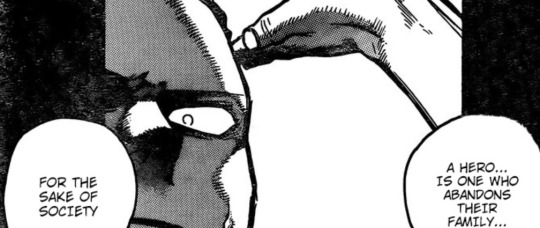

Shigaraki is another victim of an abusive father, just like Dabi. Shigaraki is also lashing out, and trying to bring down the hero society, just like Dabi. Endeavor right up until Dabi arrived, and revealed himself thought he was completely justified in wanting to kill Shigaraki for the sake of everyone. Up until five minutes ago, Endeavor only saw himself as the hero, the light, meant to vanquish the king of evil.
Endeavor was perfectly willing to kill Shigaraki up until five minutes ago, because he only saw him as a villain.

And now suddenly Dabi showed up and it got all complicated and shit. However, it was always complicated and shit. The villains were never objectively bad. The heroes were never objectively good. The world wasn’t as black and white as Endeavor saw it.
Now Endeavor’s good action (saving all of hero society as number one hero), requires something most people would consider to be objectively bad (putting down his own son).
The personal investment that Enji has in both Toya being his own son, and also his guilt over what he’s done to his family in the past, now make it impossible for Dabi to be just another villain.
Except Dabi is Shigaraki. Dabi is Shigaraki, Himiko, Twice, Shuichi (not compress tho he’s just in it for the drama of it all). The villains in this story are trying to draw the attention of the heroes to problems within society, problems that have negatively affected them, so they can be fixed. You can’t fix something if you’re blind to it. You can’t deal with something by ignoring it. Dabi’s confrontation isn’t only inevitable, it’s necessary for moving forward.
The shadow isn’t destroyed or ignored, it’s accepted, because in the end it’s a part of you. You are both everything good about you, and all of your flaws at the same time. Living as a fully rounded person means acknowledging that.
Enji’s development is about putting his selfish sense of entitlement aside and learning how his actions have impacted others. Here is Dabi, dancing around going “Hey, Dad, this is how your actions have impacted me. Look at my burns.”
Confrontation is good. The hurt feelings that have been repressed should be expressed.
If Enji had continued on being ignorant, he would have unknowingly torched his own son, and just seen him as another one of the villains. Isn’t that the worst possible result? Beyond hero and villain, isn’t a father killing his own son tragic?
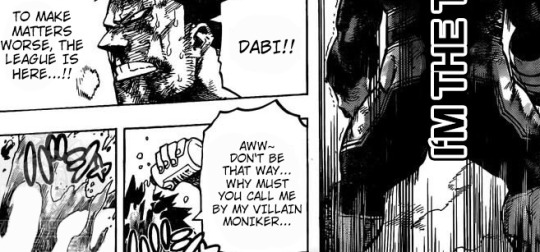

Dabi’s personal revenge is wrong. His decision to lash out is wrong. His obvious desire to kill himself, and then his own father isn’t just wrong, it’s unhealthy. Trying to burn yourself alive and be a martyr to a cause because you think there’s no good reason for you to be alive, and you’re going to die anyway no matter what you do - is in fact a bad coping mechanism.
Dabi is wrong, however, ignoring what happened to him is also wrong. It’s all wrong. Trying to repress those hurt feelings is just as unhealthy a coping mechanism, as lashing out with them.
Dabi is all hurt feelings, yes, he can’t forgive and he can’t forget, but maybe some things like the past shouldn’t be forgotten. Rather than ignoring the past you can acknowledge it, learn from it, reincorporate it into who you are now, because the past is just as much of a part of the present as Dabi’s burnt skin and scars are a part of who he is now.
#todoroki touya#dabi#bnha spoilers#bnha 290#mha spoilers#mha 290#i love that i can use that tag now#touya todoroki#todoroki toya#toya todoroki#league of villains#mha meta#my hero academia theory#dabi is a todoroki#todoroki family drama
506 notes
·
View notes
Text
Extra thoughts on Daisuke x Suzue (Anime and Novel)
I was prompted to write this when a friend asked me several prodding questions on Daizue’s relationship and feminism several days ago. Obviously my friend knew where to hit the right nerve LOL
So I thought about it and I’d like to share my thoughts. I don’t know whether my DaiSuzu followers are still hanging around, but if you see this, then this is for you. This post is very opinionated of course so you may not agree with what I have to say.
I took the initiative to go back and watch some of the FKBU episodes, and then top it off with the novel. As I mentioned in numerous older posts, the novel is the original and was written sometime in the 1970s. If you can read Japanese, I strongly recommend you grab a copy and read it for yourself. It goes into a lot more depth with regards to Daizue’s relationship and there is a lot more development between the two.
Novel and anime are different yet there are similarities. What I am going to write here is purely about DaiSuzu and because there are only minute differences in their interactions in both novel and anime, I will combine the two elements together. But before I do that, I want to talk a little about Suzue.
Suzue
I absolutely love Suzue’s character - in almost every single aspect. She is strong, clever, independent and defies all odds. Her personality and interests are definitely more pronounced in the anime in terms of strength and defying the odds. She does the hard yard - a mechanic, an engineer, a creator, a pilot, a spy, an intelligence operator - she is a one stop shop and she is not just a pretty face. Then we have her novel counterpart, who shares similar traits that concerns intelligence and independence. She does intelligence and spy work for Daisuke as well, and the only thing that was absent would be her ‘mechanics and gadget development role.’ Given that the book was written in the 70s by a misogynistic piece of shit, I am surprised the author gave Suzue that level of prominence.
When I saw the promotional materials and then the second episode of FKBU, I was so excited! Finally, a strong female character who has all the ‘male dominated’ traits! I was looking forward to what the anime had to offer her, considering the creators were talking about giving Suzue an ‘important’ role in the anime. And throughout the series, her character in that sense did not disappointment. She did a lot of work for Daisuke and she was the backbone of everything. She even had to rescue him at times. What an incredible woman.
In comparison, novel Suzue, although a prominent, intelligent character, still had some level of submissiveness to her that screamed ‘I need a man to save me and do things for me’ kind of way. Unsurprising of course being written by an old fashioned man in the 70s. So the anime in a sense was a breath of fresh air.
Then we see the lack of screen time. Although Suzue was just a supporting character, she was quite prominent in the novel. The anime went through all this trouble to create such an incredibly strong female character, but gave her such little screen time. Disappointment doesn’t even begin to describe it. I’m just frustrated that it is always the bloody male characters that gets a lot of screen time. I don’t give two fucks about your need for a fanservice or to appease fujos, we need more female characters who are strong, clever, independent, does not need a man to save her, is not overly sexualised and gets plenty of screen time. If it’s not one, it’s another. Can’t they just bloody do it all together? Also, have three main characters, Daisuke, Suzue and Haru ffs.
Feminism & Anime
If you trawl through my blog, there are a lot of posts about women, feminism, misogyny, toxic fandoms and a lot of het ships. Although I do absolutely love my M/M and F/F ships, there is a reason for my interest in anime het ships. I am a social worker who specialises in working with victim/survivors of family/domestic violence and sexual assault (DVSA), and complex trauma. Considering the majority of perpetrators are men, and the majority of victim/survivors are women, it is important to emphasise the need for a healthy and respectful relationship. I enjoy bringing my feminist perspective to film and fiction because they are an extension of society. Film and fiction (including anime and manga) are based on societal perceptions, and characters are still, unfortunately, heavily gendered.
The anime fandom consists of real people and if you look all over social media, people talk about the characters all the time and their thoughts on them. It comes from somewhere. So when I watch anime, and when I see a male and female character get together in a manner that is healthy and respectful, they get a standing ovation from me. In particular, is when a male character treats his female partner in a way that empowers her or if he abstains from using his male entitlement to demean her. Because in society, there is still a large proportion of men who continues to abuse women in every way possible. If fans are constantly viewing content (yes, even ‘cartoons’) where women are objectified and disrespected comparatively to men, that rigid stereotype is reinforced and ingrained.
I just want to add a note here that the LGBTQIA+ community do experience DVSA as well and this post does not disregard or invalidate them in any way. The focus of this discussion however, pertains to men, who make up the majority of perpetrators and, women, who are the majority of victim/survivors.
Daisuke and Suzue
I answered an ask sometime ago about why I ship DaiSuzu and although that has not changed, I have given a lot more thought to the reasoning behind it. The one thing I dislike about Suzue is her obsession with Daisuke, both in the novel and anime. It does take away her cool, independent like character, and submit her to the idea that she is nothing without first appeasing a man (Daisuke in this case). I don’t want to put too much dislike into her character in the anime, because we never got to see what her history was like with Daisuke. In the novel, I do see elements as to why she can be a bit obsessive, and that was most likely to do with her being ‘adopted’ and given a second chance. It was her way of showing appreciation. Yet she does have romantic feelings for Daisuke, so in essence, her character was emphasised as a typical lovestruck woman 😒
Again, she was incredibly loyal and forgiving towards Daisuke in the anime, despite his shitty attitude towards her at times. You’re probably wondering, after all that I wrote about feminism, why I would still ship DaiSuzu? In the anime, that comes down to Daisuke’s trauma. It added an extra layer of complexity. Daisuke’s standoffish, cold behaviour towards Suzue was not out of a sense of male entitlement and disrespect towards Suzue being a woman, rather, it was a manifestation of his trauma. Of course, it does not excuse his behaviour, but this is the reason why I really enjoyed watching their relationship. There was a lot of mutual trust going on (which I wrote about), covert appreciation of Suzue’s skills and abilities and Daisuke’s own way of making amends with her.
In the novel, however, Daisuke does not have a history of any traumatic experiences. His personality was a lot more animated and though he does exhibit some weird behaviour towards Suzue, he does not do it out of male privilege or misogyny. He was just dense (and an idiot).
Regardless, DaiSuzu’s relationship isn’t just as simple as black and white. There are elements of feminism that intertwines the anime and what I love a lot about Daisuke was that he never put Suzue down, felt intimidated, or tried to make her feel inadequate for being more clever and more intelligent than him. He relied on her knowledge, her skills and her expertise to guide him through his missions, because not only did he trust her with his life, he believed in her skills. He quietly allowed her to do her job without questioning her abilities or intervening.
I won’t discuss how shit the anime was and how much they shat on Suzue’s character by making her Daisuke’s relative, but like I said, I was pretty impressed with the way they turned Suzue into a strong character, and Daisuke’s perception of Suzue as a woman.
And yes, Daisuke doesn’t deserve Queen Suzue. And if you were again to ask me about Daisuke’s true feelings for Suzue? I am pretty damn certain that he loves her to death - in both novel AND anime.
#if onlyyyyyyy there was a season 2#i doubt it though#i still want to know more about suzue#beautiful precious girl#she deserved soo much more#i'm so advocating for more good strong female characters#i still do love daisuzu#even though i don't think daisuke deserves suzue lmao#i'm just biased#and i love my suzue#she queen#daisuzu#daizue#daisuke kambe#suzue kambe#balance unlimited#fugou keiji balance: unlimited#fkbu#anime feminism
35 notes
·
View notes